#'his destiny will be the destruction of all humanity' / 'guide us to our destiny' / 'the path of fate is already chosen'
Explore tagged Tumblr posts
Text
the sea of lava splitting spell being "part before me and reveal the path to our destiny" is extra rude after everything huh
#path motif#tdp viren#s3#3x06#theme: destiny#arc 1#mine#'his destiny will be the destruction of all humanity' / 'guide us to our destiny' / 'the path of fate is already chosen'#vs the path of freedom is the path of truth#bc 'fate is a lie nothing is written in stone you ARE free'
23 notes
·
View notes
Text
Saturn Atmakaraka: Finding Light on the Path of Karma
"Saturn , has a tall and thin body, has yellow eyes and is airy (vata) in constituition; he has large teeth, is lazy and has coarse hair." Parashari 3.28-29
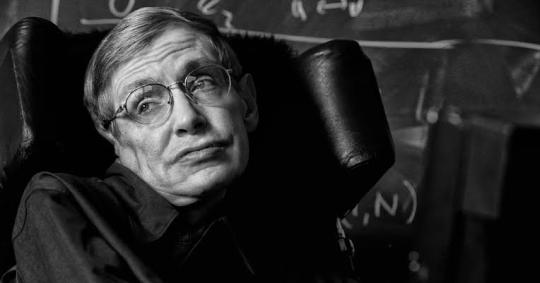
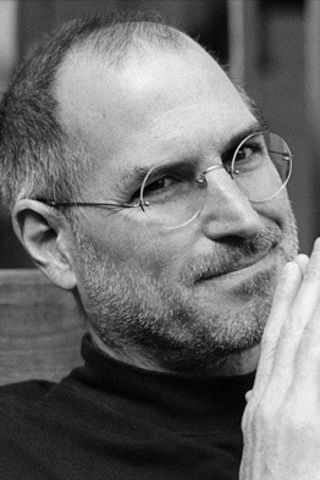
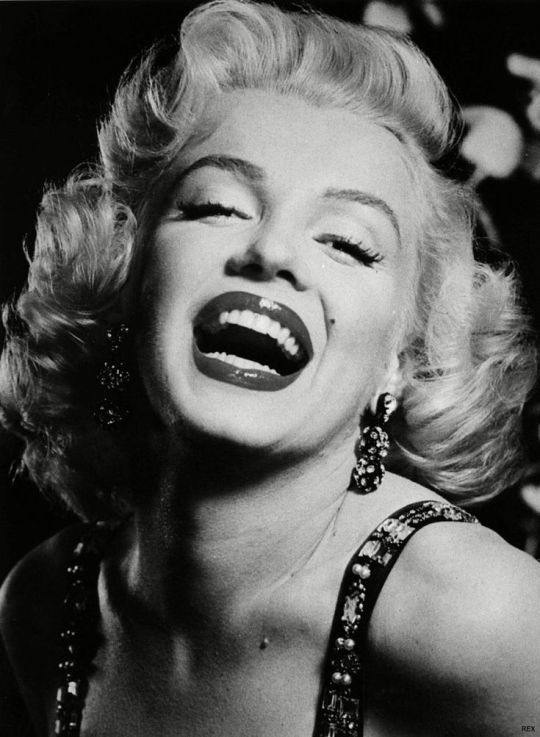
In Vedic astrology, the concept of AtmaKaraka is one of the most profound and revealing in the natal chart. The atmaKaraka, also known as the “soul indicator”, is the planet that bears the greatest responsibility for the individual’s spiritual journey. It represents the greatest challenges, lessons and the path that the soul must take in this life to achieve growth and fulfillment. The planet with the highest degree in any sign becomes the AtmaKaraka, “the significator of self” or “self-indicator”. This, as the lord of the Ascendant, can become the most powerful planet in your chart. It is the most important planet to consider when judging an individual’s spiritual nature, particularly in relation to its position in the ninth harmonic chart (navamsha). He provides us with a key to the aspirations of the soul. We often consider its position, such as the Ascendant, and read the chart indications accordingly.
This planet not only guides the purpose of life, but also indicates internal obstacles that a person needs to overcome to find their true identity. The AtmaKaraka position shows how we deal with our weaknesses, how we develop spiritually and where we should invest energy to evolve. The Atmakaraka carries the most important karmic lessons for this incarnation, becoming a key to understanding destiny and the soul’s inner motivations. Although there are many other important points in the birth chart, the Atma is special because it is a direct representation of the qualities that our soul has already mastered in past lives and those that still need to be worked on. Depending on which planet occupies this position, the nature of these lessons varies profoundly. AK influences how we approach challenges in different areas of life, right down to our spiritual worldview.
Saturn is traditionally the most difficult of the major planets, the legendary king of the malefics, that's why Saturn Atmakaraka is the most challenging. He often faces challenges in life, especially in the areas of work, health and relationships. Saturn is the significator of life itself. It indicates fate, term of life, longevity. A strong Saturn protects the life. Saturn is the planet to be propitiated in old age. He indicates the regime necessary for full life and longevity, violating which we suffer from premature decay and death. Though Saturn possesses a higher and more beneficent side, at least from the standpoint of the spiritual life, even this is stern and exacting, hard to live up to and to endure, a power of discipline, asceticism and solitude.
Saturn brings limitation and obstruction, hindrance in self-expression and in self-manifestation, which may become oppression and adversity. He is also known for being the God of Death, while Jupiter is a kind God. As Jupiter is the God of joy, he is the God of sorrow. Saturn is the significator of disease, old age and death; the great enemies of human life, which overcome all life bound by time. Therefore, the placement of Saturn in Atmakaraka is the ultimate issue of our life and destiny, the hard facts or the harsh reality that we must face. Because Saturn in the Atmakaraka indicates that the person may feel that his or her life is too tied to issues of responsibility, the need to make sacrifices or deal with pain and suffering in a constructive way. Here, destiny does not present itself easily or immediately, but is forged with perseverance, patience and facing the harshness of reality. For those with Saturn Atmakaraka, reality may seem harsher and so they may become depressed in the face of it. They refuse to give in to destruction but destruction is the necessary counterpart for creation, as is decay and death required for new life and growth.
Saturn gives bad luck, misfortune, difficult karma. It is the planet of bad karma or unhappy destiny. However, these may come upon a soul not because it has been bad or slow to evolve in past lives. Some souls, particularly those who are more advanced, may seek such things as a means of faster and deeper spiritual growth in life. Anyone can turn to the Divine in prosperity, but who can do so in great adversity? Such is the measure of a great soul. Saturn is also the suffering that makes us grow inwardly.
The influence of Saturn is to delay, to hold back. As the slowest of the planets, he slows things down, holds back their development. Those retarded in mind or speech are often under the strong affliction of Saturn. He makes us deaf and blind, stunted or deformed.
Saturn is the significator of old age, the God of time, who brings on all the degenerative processes of aging, the failure of our faculties and our powers. To the such a badly placed Saturn causes premature aging. Saturn takes away our vitality, on a physical or on a mental level. He causes depression, melancholy, self-pity and gives rise to worry, fear and anxiety. As a nervous planet, Saturn obstructs nerve functioning. He may cause numbness, paralysis or degenerative neurological disorders. His obstructing and repressing influence on the mind may promote neurosis or insanity. Saturn is behind most diseases, particularly chronic, degenerative diseases, diseases of old age, including arthritis and Cancer. As representing decay he can cause an accumulation of waste materials in the body and often is a point of devitalization in the chart.
As the planet of the ego, Saturn is also the planet of fear, on which the ego is based. Saturn creates fear and darkness in the mind. It makes us feel that we cannot overcome things, that life is against us. It makes us doubt ourselves, doubt even the Divine, and makes us prey to dark fears, fantasies, and phobias.

Saturn Devouring His Son is a painting by Spanish artist Francisco Goya. It is traditionally considered a depiction of the Greek myth of the Titan Cronus, whom the Romans called Saturn, eating one of his children out of fear of a prophecy by Gaea that one of his children would overthrow him.
Saturn is the God who eats his own children, who devours his own progeny. He raises people up, but eventually brings them down in a very precipitous fall. Those who are under the spell of their basic values will eventually be destroyed by them. He shows falsehood for what it is, in which there is the revelation of the enduring value of truth.
Saturn is not only in many ways the lowest of the planets, it is also the highest. Its lesson is the most difficult, but the most rewarding. Saturn is the grandfather spirit and lawgiver, our guiding ancestor. He represents not only the negative influence of the past that constrains us, he represents the positive spirit of the past that brings order and consistency to our lives. Saturn in Hindu mythology is the son of the Sun. The Sun moves in a chariot driven by Saturn. Saturn is the darkness, death and sadness that we must overcome for the revelation of the true light. He is the guardian of the mysteries of truth - which is possible only through a very precise and demanding cultivation of attention. Saturn is the yogi in meditation. He can give complete detachment and independence. He is the one who stands alone and goes beyond the limitations of the masses. It shows the path of transcendence, though necessarily difficult, by which all limitations can be overcome by resorting to our true and unlimited Self. In this respect, the power of Shiva, the lord of the yogis, the god of death and transcendence, can work through Saturn.
Saturn in the Atmakaraka places the individual on a path of self-improvement, where life experiences often involve long periods of effort without immediate rewards. The soul, in this case, seeks fulfillment that can only be achieved through discipline and acceptance of limitations, whether in relation to external issues (such as social responsibility, work and professional life) or internal issues (such as overcoming fears, insecurities and deep psychological issues).
Saturn here forces the person to face reality as it is, without illusions or escapes, leading the soul to mature and become more aware of the responsibilities it carries, whether in terms of individual karma or in relation to the collective. Life may seem like a constant search for stability, security and structure, but at the same time, Saturn demands patience to accept that the fruits of this search will not come immediately. Therefore, Saturn in the Atmakaraka is a position that brings depth and intensity to the spiritual and personal journey, challenging the individual to find greater meaning through experiencing the harshness of life, while working tirelessly to build something lasting, grounded and realistic.
#astronomy#jyotish#vedic astrology#astrologia#vedic astro observations#nakshatra#spirituality#spiritual awakening#dark moon#astrology#numerology#dark femininity#dark feminine energy#dark feminine aesthetic#sidereal astrology#vedicastrology#psicology#psicologia#thriller psicologico#ketu#rahu ketu#vedic astro notes#signos#astrologia védica#atmakaraka#materialist feminism#saturn#saturn atmakaraka#sharavana#uttara ashadha
165 notes
·
View notes
Text
The Seduction of Power: Sauron and Celebrimbor's relationship
This analysis is not thought of in a romantic or human way. But it follows the patterns of elven and more powerful creatures who have feelings like us, but guided by greed and power.
As in my previous analysis, to understand the full extent of the relationship between Sauron and Celebrimbor, we must return to the Beginning of Days, the First Age. Our story begins in Valinor.


When Eru's eldest sons, the Firstborn, awoke, the Valar assembled a company to lead the Elves to safety in Valinor. Many were lost on the journey, and many went on to live among the gods.
And the Valar loved the Elves dearly, and the Elves loved them. When the Valar brought war to Melkor and overcame him, he was taken captive and the Elves lived in peace. For nine ages Melkor was under the dominion of Mandos, and the Elves knew peace.
As the ages passed, Melkor's imprisonment ended and the Valar fulfilled their promise. Melkor asked his brothers for forgiveness and humbled himself, promising to heal the evil he had caused and to live in peace with the elves and gods. But in his dark heart, Melkor envied the elves, who were the cause of his capture.
However, not all the Elves trusted Melkor's words. And the Teleri, most beloved by Ulmo, trusted the Valar and turned their backs on Melkor. Despite this, not all were against Melkor. Especially the Noldor.
In this age, Finwë was king of the Noldor and loved his eldest son deeply. Fëanor was a powerful Noldor prince, rich in knowledge and power. A great smith and master craftsman, he forged the Silmarils, and Melkor desired them. And these same jewels would doom countless Elves and Men to their doom. And even Celebrimbor would see his ruin at their hand.
Melkor poisoned Fëanor with his lies and greed, and the Elves turned against the Valar. Departing Valinor with the ships of his murdered kin, Fëanor took his children and followers with him to Middle-earth. And much sorrow came from his choice.
Fëanor had seven sons, seven sons who swore never to rest until they had obtained their jewels again and destroyed Melkor. Curufin, his fifth son, had a son named Celebrimbor.


Elrdon calls Celebrimbor the Greatest Elven Smith. But Celebrimbor is not just that. According to the accounts in the book, Celebrimbor is a handsome Noldor prince, who fought in Gondolin, who fought strongly against Morgoth in countless battles and was present in the War of Wrath.
The weight of his grandfather's legacy still weighed heavily on his shoulders, no matter how powerful and learned he was. Fëanor's legacy would always cast a shadow over Celebrimbor.
It's hard to draw a correct parallel between Celebrimbor's story in the series and the books. But I do wonder about Celebrimbor's relationship with his father, Curufin. Celegorm and Curufin in the tale of Beren and Lúthien, well, they didn't seem very friendly.
And this makes me think that perhaps Curufin was not an extremely loving father, although Fëanor seemed to be attached to his children and to have loved them, despite everything.


When Celebrimbor talks about "true creation requires sacrifice", did he think about how the Silmarils cost his family? How the jewels and the oath destroyed everything good in them and condemned them to eternal suffering?
Elrond's comment about the beauty and destruction of the jewels brings out Celebrimbor's insecurity. There again is the shadow of his grandfather over him. He does not trust his creation, believing that it will never be on the level of his predecessor.
The parallel between Elrond and Celebrimbor is very interesting. When Celebrimbor talks about Elrond's father and how their destinies were intertwined. Sons of powerful men who were present in their legacy. And continue to dictate how their lives should be, always determined to make those who left them proud.


Desperate to save Middle-earth, Celebrimbor and Gil-galad hide their true intentions from Elrond towards the people of Khazad-dûm. Elrond had his trust betrayed and unknowingly lied to his great friend. For me, this is the first sign that Celebrimbor would do anything for power.
Could this gaze, blinded by the value and power of Mithril and its composition, the way it could save the elves, be a foreshadowing of his greed for the creation of the Rings of Power?


Middle-earth is made up of many points of no return. Durin III's choice not to aid the Elves in their struggle for survival, and Halbrand's arrival in Eregion.
It is now that Celebrimbor's story changes forever. He meets this man, this mortal, who fought alongside Galadriel and nearly died at the hands of the Orcs. Halbrand's vulnerability and purity is Sauron's first deception.
When Halbrand asks if Galadriel is there, in the forge, I don't believe he was genuinely looking for her. After all, why would she be there? He knew whose kingdom it was. It's all part of the illusion.
Celebrimbor beams when Halbrand speaks of "The Celebrimbor." This inflames Celebrimbor's ego. Yes, the elves know of his legacy and the legacy of his family. But for a mere mortal to meet him?
It is a treat, no doubt. He was recognized for his craft, not his grandfather's. And Halbrand speaks of his master who taught him his craft and spoke so much of Celebrimbor. Of course Morgoth would speak of Fëanor grandson!
Halbrand appears humble and ashamed of his lack of knowledge before Celebrimbor. When Halbrand talks about the ways to combine metal and jewelry, Celebrimbor is enchanted by his knowledge. Halbrand becomes indispensable at that moment.
How did a mere mortal clear up an elf's doubts? He must surely be important.


"Call it a gift."
With these simple words Sauron's deception was laid and he knew that he had tricked Celebrimbor. Sauron's seduction is there, when Galadriel, Elrond and Celebrimbor talk about the salvation of the elves with Gil-galad, we see the beginning of the poison in Sauron's words.
A crown? Gil-galad is too pure to consider carrying such an artifact of power without suspecting its corruption. But Celebrimbor looks at him madly, intoxicated by all the power they could achieve. And it is his words that alert Galadriel. A power not of the flesh, but over flesh. Words spoken by Adar, but which he learned from Sauron.
And from whom else could Celebrimbor have heard those words? He had been so close to Halbrand alone lately. And his presence had overwhelmed him. The gentle, caring elf was frantic and agitated, raising his voice and nearly losing his temper.
The chain behind Celebrimbor? That unusual shadow on the ground? It is no coincidence, it cannot be. What if this was the beginning of the bonds Sauron was binding him with? The beginning of his corruption and ruin.
If Galadriel suspected Celebrimbor's words, why didn't she stop him? Why didn't she warn the others? Because, like Celebrimbor, she was desperate to save the Elves and remain in Middle-earth.
And I believe that deep down, she was in denial. She had hunted the terrible and wicked evil Sauron for centuries, how could this human be him? Galadriel trusted Halbrand, enjoyed his company, she could not prevent the forging of the rings on suspicion. And her denial was decisive for Sauron's victory.


Sauron takes advantage of this. He tortures Galadriel, claiming that she helped him and that she can never escape this. No matter what happens, Galadriel's intentions were never evil.
And for this she blames herself, for deep down, she is good. And now Halbrand/Sauron has escaped. The Rings of Power are ready and she asks Celebrimbor to never accept the return of the mortal king.
But why? She never explained, so it was obvious that Celebrimbor could not keep his promise.
Then we have a decisive event. Celebrimbor is inaugurating a new forge, eager for answers from the Three Elven Rings. And that's when his new hope arrives on a white horse. He came to propose a deal, they say. But what could he offer?
We can then glimpse his new deception. The suffering mortal king has returned begging for help, but Celebrimbor refuses to receive him. Sauron then tries to seduce Mirdania. Does she want him to leave? Well, if she doesn't want him to, he won't. So he lets her notice his injuries, as he suffered at the hands of the Orcs.
Unconsciously, like Galadriel, Mirdania takes pity on Halbrand. She takes his side, saying that he looks hurt. That the night is cold. However, Celebrimbor tries to keep his promise; he must be faithful to Galadriel. But Mirdania is softening his heart.


Sauron is the Great Deceiver. He knows the deepest desires of the lustful heart. And he knows what Celebrimbor is desperate to know. Have his Rings of Power worked? Galadriel has kept Celebrimbor in the dark, but Halbrand is there to tell him of the progress.
If the Rings of Power saved the Elves, would they be able to cure all the ills of Middle-earth? Who knows. But Sauron uses these thoughts to convince Celebrimbor. But how could he know of the Dwarves' suffering? That's when he puts an end to the mystery.
Sauron is being truthful. He is not Halbrand, a king, or a mortal. Sauron can be truthful when he wants to be. But his truth is always tainted by his lies and his own tricks.


The breaking point has come. Sauron lays bare Celebrimbor's greatest desire. To be recognized, to be revered. To be remembered as The Lord of the Rings. To escape his grandfather's shadow once and for all. Whether it's Sauron's ethereal appearance, or his manipulative words, the fact is that Celebrimbor wants what he's offering so badly that he ignores his fears.
And Annatar is humble. He is powerful, but he does not seek reverence, or thanks. He is an emissary of the Valar, and he only wishes to share his knowledge with Celebrimbor.
"Annatar. A sharer of gifts."
When he heard these words, did Celebrimbor remember Halbrand's words? Was that all it took to earn his trust?
Celebrimbor accepts Annatar's advice and now they need to help the Dwarves. Celebrimbor is a good person, he is kind and described in the book as a great friend of the Dwarves. And he says this to Durin IV. They helped them before, now, it is time for the Elves to help.


Sauron knows that Gil-galad has sent a messenger in his name. A messenger who would thwart his plans to forge the rings.
Celebrimbor is isolated from the people of Lindon, Galadriel and Elrond are far away. He has Celebrimbor in his hands. The Dwarves do not trust him at first, and why would they? Where did this emissary of the Valar come from?
But Sauron is a clever liar. The Dwarves are suffering and they have no choice but to rely on the Elves to survive. And Sauron must appeal to Celebrimbor's pride. Who does Gil-galad think he is to stop the forging of new rings? Who, indeed? Perhaps the King of all the Elves? Celebrimbor is too blinded by power to reflect.

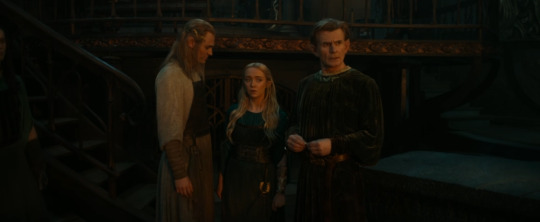
Sauron, however, is greedy. Rings for the Dwarves are not enough. He always wants more. More power. More servants. If he is to heal Middle-earth, he needs everyone under his control. So he pretends, and talks about how frustrated he is about the suffering of men. How they deserve rings to protect themselves.
It is madness and Celebrimbor knows it. Men are fragile and easily corrupted. Many have followed Morgoth without any effort. Sauron reminds him of all the great men who have ever lived, but it is not enough to convince the elf. Like a child, Sauron refuses to accept no and awakens Celebrimbor's greatest fear. Annatar will make the rings without him, he is no longer needed.
Sauron’s manipulation is nearly complete. Without Celebrimbor’s help, Mirdania see the terrible evil that lies among them, the evil hidden all along. Annatar calms her, gaining an ally to his side. She believes Annatar, and so believes that men deserve their rings.
Durin IV adds to Celebrimbor’s concerns, but he tries not to see them. Power weighs heavily on his shoulders, and accepting the truth is too difficult. Annatar deceives him, claiming that it is the lies of the making that are affecting the rings.
Celebrimbor desperately needs to make amends for his mistake with the Dwarves. He forces himself to accept the creation of new rings, but something seems wrong. While Annatar is kind and caring to the Elves, Celebrimbor is slowly losing his way. His actions surprise even himself.


If things aren't bad enough, they can always get worse, right?
The rings don't work, something is wrong. Who knows, because deep down, Celebrimbor knew that those rings couldn't be created? A part of him could have been suspicious of that creation.
But he's losing his mind, he's angry and unstable. And Celebrimbor has forgotten Mirdania's name, his protégé. How could he do that? I would say, in my humble opinion, that Sauron had his claws deep inside him, subtly controlling his decisions, so that he would only be able to think about the rings and do nothing until he completed the nine.
As the worthy manipulator, Sauron is increasingly isolating his victim. Preventing Celebrimbor from leaving the forge. Most importantly, Sauron is comforting Celebrimbor, giving him support and standing by his side. Who would suspect an emissary of the Valar?
However, Adar is getting in the way of Sauron's plans. The rings cannot be forged if Eregion falls. Sauron does not have much time left and he knows it, he must redouble his efforts.


The Dwarves will not give Sauron peace either. He leaves Eregion, but does not get what he wants. The rings are corrupting the Dwarves, and greed is consuming the king's heart. Did Sauron know about the Balrog? Was it at that moment that he realized he had no need of a people who would find their own ruin?
Whether it is the work of the Valar or not, Celebrimbor senses that something is happening in Eregion and Annatar is not informing him. He does not stop creating the design of the rings, but something is disturbing him. His peaceful and calm kingdom is under attack, is it possible?
When Celebrimbor tries to leave the forge, Sauron is there to stop him. He knows that Celebrimbor will not create the rings if he knows that a siege is underway and his people are being attacked by Adar's army.
Desperate to keep Celebrimbor trapped in his web of lies, Sauron forges the most perfect illusion to confuse the smith's mind. Eregion is safe and sound. Why can't Celebrimbor return to the forge?
This, I would say, is his greatest manipulation. Sauron uses Celebrimbor's greed, his desire to be greater than the creator of the Silmarils, greater than his family's legacy. There is the statue depicting Celebrimbor's insecurities. Everything is fine, Sauron even managed to get the Mithril for the rings. Celebrimbor, blinded by power, seduced by Annatar's words, once again follows him.


While Eregion has been under siege for weeks, Celebrimbor keeps his forge burning and never stops. The world is at peace, ideas are clear, and he only has Annatar to thank.
Was Annatar sincere? That it would be a shame when his partnership with Celebrimbor ended?
Honestly, I would say so. But not for the reasons Celebrimbor imagined. Without Aulë and Melkor, Sauron had no one left to share his craft, his passion that did not abandon him even when he turned his back on Valinor. And Celebrimbor, the greatest Elven-smith of his time, is almost his equal.
However, he knows that Celebrimbor would never agree with him, so he must leave in the end, even though it is a shame for both of them.
The illusion is, however, failing. Sauron is spending too much energy holding back the people of Eregion and preventing the attack of Adar long enough to forge the rings. His mind is not fully devoted to Celebrimbor, and that is his greatest mistake.
Celebrimbor begins to notice the small inconsistencies in the environment. The fire burns the same every day. The little mouse who repeats the same patterns. But he already knew that, didn't he? He knew what Annatar was doing, but he couldn't admit it to himself.
Sauron's mask finally falls.
Sauron tries to convince Celebrimbor of his truth. To Sauron, he was obviously doing the elf a favor, teaching him his knowledge and improving his creation. Sauron genuinely believes he was helping him, in his own way.
"I am the one keeping the storm at bay."
Ding Dong, Sauron and his twisted view of healing is knocking at the door again!
Sauron is confident that he has done everything in his power to make Celebrimbor prove his worth. Did he feel that way about Melkor? Did he believe that all the suffering and pain caused by his master would help him to become more improve? Probably.
I believe that breaking the illusion was more painful. Forcing Celebrimbor to contemplate the destruction of his beloved kingdom, to observe the death of his people and, worst of all, to realize that none of them believe him, not when Annatar is there, claiming that the master blacksmith has gone mad.
Celebrimbor is left to deal with his guilt. Sauron’s revelation is not only cruel, but devastating. Celebrimbor realizes that he helped Sauron, and that is a hard truth to swallow, and Sauron knows it.
For me, Mirdania’s death was Celebrimbor’s greatest regret. She was his ward, and he lost her to Sauron. She trusted Annatar and died believing in him, and she died at his hands.
And the death of Mirdania is the breaking point. There is nothing left for Celebrimbor. Sauron is the Great Deceiver and he has won. Celebrimbor is tired of fighting.


Honestly, Sauron almost fooled me too. When he talks about the suffering caused by Morgoth, I don't think that's a lie, not to him. He suffered at the hands of a Valar because their worldviews were different. Morgoth wanted to destroy and Sauron wanted to heal, but in the end their methods were the same.
The lie is revealed throughout the conversation. Did Sauron want to hurt Celebrimbor? Yes and no. As in an abusive relationship, Sauron believes he hurt him because he had to, but did not want to. As he says, Celebrimbor caused it, and that is his truth.
In a desperate attempt, Celebrimbor tries to destroy the rings. But the Rings of Power are too powerful for the fire. All that remains is to escape with the rings, and there is Galadriel, his beloved friend, as if sent by the Valar.
It's a very difficult conversation, I must admit. Galadriel realizes that Celebrimbor hurt himself to escape Sauron and save Middle-earth. And after so much suffering, she is the only person who trusts Celebrimbor.
Galadriel and Celebrimbor share the same guilt. Focused on their hearts' desires, they were seduced by Sauron's promises and power, and this hurts them deeply. They wish more than anything to make amends for the harm they have caused, even if unintentionally.
Sauron is enraged and Galadriel leaves with the rings, she is the last hope of Middle-earth. Celebrimbor is once again alone, his guards are trapped in Sauron's power and he can no longer escape the hands of the Great Deceiver and his vengeance.
I still get goosebumps when I remember the sound of the bow firing its next arrow.
This is the end of Celebrimbor's legacy, the ruin of his existence. All that remains is his blood staining his forge and his body riddled with arrows. Where did the trail of blood come from, I wonder. Was Sauron cruel enough to drag the bleeding Celebrimbor here?
Sauron tries to break Celebrimbor's spirit one last time. But Celebrimbor has already lost everything, and his solace is that the rings are far away.
And he thinks of the old days, when all was fair in Eregion. I believe it is this memory, of the good times before Sauron's destruction, that strengthens Celebrimbor.
"For soon I shall go to the shore of the morning. Borne hence, by a wind that you can never follow!"
This is Sauron's greatest fear, isn't it? He has lost Aulë, he has lost Melkor. Because of his cowardice and refusal to beg forgiveness from the Valar, he will never be able to return to Valinor. Galadriel has resisted his temptation, and Celebrimbor is dying; there is no one left for Sauron.
Sauron wants to inflict as much pain on Celebrimbor as possible to make up for his words. Would he be able to use his unholy magic to keep Celebrimbor alive? Was it all for the rings, or once again because he would be alone in the world?
"Hear me! Shadow of Morgoth. Hear the dying words of Celebrimbor."
Celebrimbor's prophecy affects Sauron deeply, laying bare his greatest fears. He will be betrayed by his rings, we know that. His own corrupt power will doom him to destruction. And it breaks him, because Sauron must have believed Celebrimbor's words.
Unfinished Tales of Númenor and Middle-earth:
"In black anger he turned back to battle; and bearing as a banner Celebrimbor’s body hung upon a pole, shot through with Orc-arrows, he turned upon the forces of Elrond."
Sauron, it's time to work on all that anger.
Blinded by red rage, Sauron kills Celebrimbor and interrupts his words. Did he realize what he was doing? Always so driven by his seething emotions.
And this is Sauron's moment of breaking. He realizes what he has done. He has murdered his last equal in all of Middle-earth, once again he has fulfilled his fears, and he is alone. Why is he crying?
As I analyzed before, he was alone and there was no one to deceive. Sauron understood his actions and had no way of going back, all he could do was accept the consequences.
Just as Celebrimbor was seduced by power and glory, Sauron was seduced by Celebrimbor’s power and knowledge. Like an Ouroboros, Sauron and Celebrimbor were seduced by power and found their downfall in each other.
Sauron may have been Celebrimbor’s downfall. But Celebrimbor and his rings, and the knowledge they gave Sauron, will be the Great Deceiver’s downfall at the end of the road.
#the rings of power#trop#the lord of the rings#tolkien#the silmarillion#sauron#morgoth#celebrimbor#annatar#galadriel#charlie vickers#mairon#charles edwards#sauron x celebrimbor#trop spoilers#silvergifting#my analysis
73 notes
·
View notes
Text
WTW Power Prompts - Banes and Boons
First of all, thank you to the folks at WelcomeToWriteblr for giving me an easy way to return to this blog! I'll be hopefully completing this event for my WIP Hounds of Corduff.
I've decided to explore each of the prompts through the lens of a textbook written for preliminary students around age 7 - 9 in the country of Rosen. Vocabulary words and other important words will be bolded and there will be reading checks at the end of each chapter. Most importantly there will be pictures. Also, expect a sprinkle of religious dogma because it's Rosen so it cannot be escaped. I made all the "textbook pages" in Canva.
A heads up for this section, it's a little longer, but I wanted to explain all the Seeds as briefly yet thoroughly as possible. All of the Seeds are based on the book "Irish Trees: Myths, Legends, and Folklore" by Niall Maccoitir which was a huge inspiration for this magic system.






Text under the cut:
Destiny and Fate
There are two main forces that shape our world: Destiny and Fate. Destiny is the source of everything that is good, she is the guiding force that brings order and purpose to our lives. Fate is the bringer of chaos, a force of destruction constantly at odds with Destiny. It was Destiny that gave SporeSense to humans, and with it a responsibility to all sporecasters to use that power for the good of others. To ignore that gift is to turn away from Destiny’s purpose. However, while SporeSense is a gift from Destiny that doesn’t mean sporecasters are immune to Fate. Fate can still corrupt those with SporeSense. Some sporecasters lose sight of their purpose, twisting their abilities for selfish or destructive reasons. This is the danger of Fate’s influence, he tempts everyone, luring the weak into his service.
Destiny saw that the world needed her help, but instead of staying whole, she split herself into twenty-four special pieces called the Seeds of Destiny. Each Seed has its own personality and powers, they are born again and again to fight against Fate’s evil plans. Most of the time, they don’t even know they are a Seed until their purpose is fulfilled. All though they are all different, they work together, along with regular people, protecting others from Fate’s corruption. People pray to different Seeds for help in their life. Some are dedicated to a specific Seed at birth while others choose based on what they need.
Seeds of Destiny
The Yew Seed, the Seed of Rest, is quiet and serious, they are a place of safety. People pray to them when they need peace, protection, or a place to hide. The Pine Seed, the Seed of Warriors, is a brave fighter who protects others. Warriors and soldiers pray to them for strength in battle, both physical and mental. The Birch Seed, the Seed of Love, is full of grace and kindness, they are pure-hearted but also too trusting. People pray to them when they seek love, friendship, or healing from heartbreak. The Rowan Seed, the Seed of Protection, is strong, full of magical energy, and always ready to shield others from harm. People often pray to them to keep their children safe.
The Alder Seed, the Seed of Courage, is a fearless warrior, the Alder never backs down from a challenge. People pray to them when facing hard times or challenges and ask for bravery. The Willow Seed, the Seed of Growth, bends but never breaks, they always find a new way to be strong. People pray to them when they are being too stubborn and need flexibility. The Hawthorn Seed, Seed of Power, is mysterious and feared, they are dangerous to cross. People pray to them for leadership, strength, and ambition. The Ash Seed, the Seed of Guardianship, protects and guides others. People pray to them for the care of others, usually teachers or parents.
The Oak Seed, Seed of Leadership, is strong and proud, the Oak is a champion of action. People pray to them for wisdom and authority, usually Kings, rulers, or other people in charge. The Holly Seed, Seed of Champions, is a fierce warrior and very competitive. People pray to them before competitions or battles to bring them victory. The Hazel Seed, Seed of Wisdom, they see what others can’t, understanding things beyond most people’s reach. People pray to them for wisdom, like scholars or anyone seeking answers. The Apple Seed, Seed of Healing, brings peace, renewal, and restoration. People pray to them for healing and recovery from illness or injury.
The Elder Seed, Seed of Magic, is powerful and protective but drawn to darkness. People pray to them for hidden knowledge. The Cherry Seed, Seed of Beauty, is charming and full of love, but their happiness doesn’t always last. People pray to them when seeking love or beauty. The Whitebeam Seed, Seed of Truth, is honest and fair. People pray to them when looking for the truth or justice. The Furze Seed, Seed of Wealth, is tied to riches and fortune. People pray to them when facing money problems.
The Broom Seed, Seed of Hard Work, they are practical, helpful, hardworking, and determined. People pray to them for a good harvest or when they need help getting through tough times. The Blackthorn Seed, Seed of Sacrifice, is destined to give its life to save the Ash Seed in every lifetime. People pray to them before and after a great sacrifice, especially one that is painful. The Elm Seed, Seed of Endurance, is strong and steady, never giving up. People pray to them when they need strength for hardship. The Aspen Seed, Seed of Sorrow, brings change and sometimes sadness, knowing that loss is part of life. People pray to them when grieving.
The Spindle Seed, Seed of Sight, brings clarity and vision. People pray to them for guidance. The Juniper Seed, Seed of the Wind, is tied to air and freedom. People pray to them when they are about to make a long journey for safety. The Arbutus Seed, Seed of Mystery, is rare and unknown, they hold secrets few understand. People pray to them for answers they can get nowhere else. The Buckthorn Seed, Seed of Change, is tied to protection but also the fact that new beginnings must come from an ending. People pray to them when facing change or danger.
Reading Check:
Who are the two main forces that shape the world?
Why did Destiny split into the Seeds of Destiny?
Why do different people pray to different Seeds?
If you needed courage before an important event, which Seed would you pray to?
If you could be a Seed of Destiny, which one would you want to be and why?
You finished this chapter! Great job!
The next chapter will be about the Prophecy of Peace
#wtwevent#wtwcommunity#writeblr#writblr#my writing#worldbuilding#magicbuilding#my magic system#writeblr community#writerblr#wip: hounds of corduff
2 notes
·
View notes
Text
The Beginner's Guide to the 'Sandman' Comics by Neil Gaiman
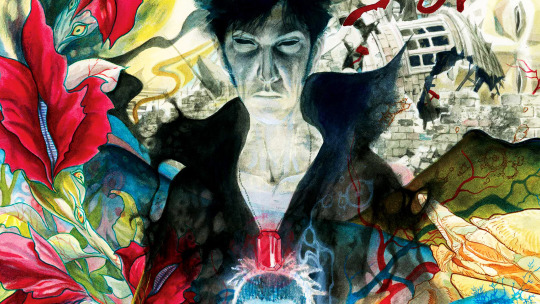
Explore the enchanting world of Neil Gaiman's 'Sandman' comics with our comprehensive beginner's guide. Uncover the mysteries of the Dreaming and embark on a journey through fantasy, myth, and storytelling in this iconic comic series. Debuting at the end of 1989 published by DC Comics and later becoming the flagship of the Vertigo sub-label in 1993, "The Sandman" introduces us to the Eternals / The Endless, anthropomorphic beings that embody natural forces or aspects of the universe and have existed since the dawn of creation, which puts them in a higher hierarchy or other types of gods and entities existing in the universe. In fact, Gaiman’s original pitch for the title was radically different and involved the regular old DC Universe Sandman... But he was unavailable, so DC asked Gaiman to come up with someone new. Tasked with creating a whole new character, Gaiman invented Morpheus, the Lord of The Dreaming - a dimension where all dreams come from. When Sandman kicked off, Morpheus was captured - accidentally - by humans, and held captive for decades. When he finally escaped, he wreaked terrible, Twilight Zone vengeance on them, before regaining his powers, and returning home to the Dreaming. There, he found things in massive disrepair, and set about making dreams right again... And returning some particular horrible nightmares (and unwilling to return dreams) home again. Over time, Morpheus grew into being more than just a vengeful spirit, and in a certain sense, a hero; though with forces conspiring against him, he was eventually killed. The last few issues of the series were the funeral of Morpheus, and that book was closed forever.
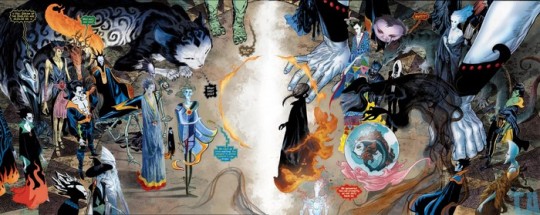
Dream, as he’s most commonly called, is a part of The Endless, a family of seven siblings who physically embody and carry out the will of abstract concepts, such as destiny, destruction, and desire. Each one of The Endless has its own tasks and rules its own realm, and in many ways, they take on the form of a sort of mythology within the DCU. The cosmic beings are said to have existed since the beginning of time and are among the most powerful creations in the DC universe. However, while the whole family plays a vital role in the events that take place over the course of the comics seven-year run, ultimately the story revolved around Dream. Along with Gaiman, the artists who inaugurated the series were Sam Kieth ("The Maxx") with Michael Drigenberg, as draftsman and inker respectively. Later a rotating team was had, highlighting Kelly Jones ("Batman & Dracula: Red Rain"), Chris Bachalo ("The Amazing Spider-man") Collen Doran ("A Distant Soil"), P. Craig Russel ("Legends of The Dark Knight ”), Dick Giordanno (“ Crisis On Infinite Earths ”), Shawn McManus (“ Fables ”), Jill Thompson (“ Wonder Woman ”), Mark Buckingham (“ Miracleman ”), Vince Locke (“ Judge Dredd ”), Marc Hemple ("Heavy Metal"), Charles Vess ("Promethea") and Michael Zulli ("TMNT: Souls Winter") who walked throughout the series, giving versatility to the art of the same by authentically exploiting the potential that the ninth is able to reach.
What are the key story arcs and volumes in the ‘Sandman’ series?
The Sandman series is divided into ten main volumes, each comprising multiple story arcs that weave together to form a larger narrative tapestry. Some of the key story arcs include: - Preludes & Nocturnes: Introduces the character of Dream and his quest to reclaim his lost artifacts. - The Doll's House: Explores Dream's interactions with various dreamers and introduces important supporting characters. - Season of Mists: Focuses on Dream's journey to Hell and his confrontation with Lucifer. - A Game of You: Follows the adventures of Barbie and her friends in the waking world and the Dreaming. - Brief Lives: Chronicles Dream's quest to find his missing sibling, Destruction. - Worlds' End: Features a series of interconnected short stories set in a mysterious inn. - The Kindly Ones: Culminates in a confrontation between Dream and the Furies, ancient beings seeking vengeance. - The Wake: Concludes the main storyline of the series and explores the aftermath of Dream's actions. Each volume offers a unique blend of fantasy, mythology, and human drama, contributing to the overall richness and depth of the Sandman universe.
How does ‘Sandman’ connect to other works by Neil Gaiman?
While 'Sandman' stands on its own as a singular masterpiece, it is also interconnected with Neil Gaiman's broader body of work. Many characters, themes, and concepts introduced in 'Sandman' reappear in Gaiman's novels, short stories, and other comic book projects. Additionally, 'Sandman' has inspired numerous spin-offs, adaptations, and continuations, including graphic novels like 'The Sandman: Overture' and audio dramas like 'The Sandman: Act I'. Whether you're exploring Gaiman's prose fiction or his contributions to the comic book medium, 'Sandman' serves as a gateway to a larger world of storytelling. At its core, 'Sandman' is more than just a comic book series – it's a celebration of the power of storytelling. Through its rich tapestry of mythology, literature, and pop culture references, 'Sandman' invites us to explore the depths of our imagination and embrace the magic of storytelling. It's a reminder that dreams are more than just fleeting fantasies; they're windows into our souls, reflections of our deepest desires and fears. So, whether you're a seasoned comic book aficionado or a curious newcomer, there's never been a better time to join the Dreaming and let your imagination soar.
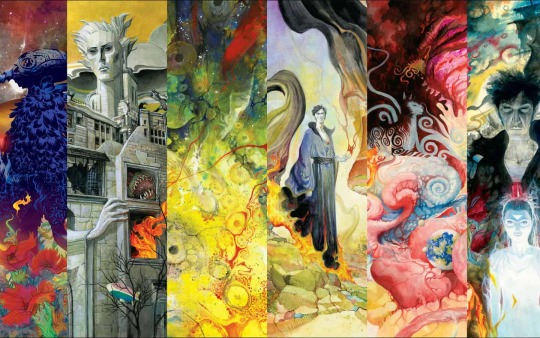
Here are 10 intriguing curiosities about Neil Gaiman's 'Sandman' comics:
- Origin of Dream's Design: Dream's appearance was inspired by a combination of Gaiman's friend, musician Peter Murphy of the band Bauhaus, and the DC Comics character Destiny from "The Endless." - Influence of Mythology: Gaiman drew heavily from various mythologies and folklore to create the rich tapestry of the 'Sandman' universe, incorporating elements from Norse, Greek, and Judeo-Christian traditions, among others. - Pivotal Role of Dream's Helm: Dream's iconic helm, also known as the Dream Helm or the Helm of Dreams, serves as a symbol of his authority and power over the realm of dreams. Its significance is explored throughout the series. - Connection to DC Universe: While 'Sandman' exists within its own self-contained universe, it also features connections to the broader DC Comics universe, with appearances by characters like Batman and John Constantine. - Award-Winning Series: 'Sandman' received numerous awards and accolades during its run, including multiple Eisner Awards, Harvey Awards, and a World Fantasy Award for Best Short Fiction for the story "A Midsummer Night's Dream." - Diverse Artistic Collaborations: Throughout the series, Gaiman collaborated with a diverse array of artists, each bringing their unique style to the pages of 'Sandman.' Notable collaborators include Dave McKean, Jill Thompson, and P. Craig Russell. - Influence on Pop Culture: 'Sandman' has left a significant impact on popular culture, inspiring everything from music and film to fashion and literature. Its themes and imagery have been referenced in works ranging from the TV series "Supernatural" to the video game "The Legend of Zelda: Majora's Mask." - Themes of Identity and Existence: Central to 'Sandman' are themes of identity, existence, and the nature of reality. The series explores questions of free will, destiny, and the human condition through the lens of its diverse cast of characters. - Spin-Offs and Adaptations: In addition to the main series, 'Sandman' has inspired numerous spin-off comics, graphic novels, and adaptations in other media. This includes "The Sandman: Overture," a prequel miniseries written by Gaiman himself. - Enduring Legacy: Despite concluding its original run in 1996, 'Sandman' continues to capture the imagination of readers worldwide. Its themes of imagination, storytelling, and the power of dreams ensure its place as a timeless classic in the world of comics and literature. Sandman was a seminal work that catalyzed a creative renaissance in comics. Its breakout success established Vertigo Comics as a platform for intelligent, adult-oriented graphic fiction. In Sandman’s wake, Vertigo published acclaimed series like Hellblazer, Preacher, and Fables – cementing the imprint’s reputation for crafting literate fantasy and horror. Beyond Vertigo, Sandman revealed the latent potential of comics to render sophisticated, moving stories. Gaiman wielded the medium with a poet’s grace, spinning tales as richly metaphorical as any prose. This alchemy of word and image helped legitimize graphic novels as a genuine art form, paving the way for today’s most celebrated works. Read the full article
1 note
·
View note
Text
Even though Wolfwood is very much not an actual Catholic priest, I do find it compelling that Vash--someone without any religious beliefs and minimal exposure to "Christianity," courtesy of Rem (OG Trigun)--is the most faithful of the two.
And by "faithful," I don't mean so much in a religious or Christian sort of sense. More that Vash holds onto his faith that there is good in people and that everyone is worth saving. That the taking of a life is something so unspeakable to him that it will literally cause him immense mental, emotional and physical pain when he is forced to do so. His unshakeable belief, i.e. his faith that every life is precious and no one is beyond redepmtion irregardless of how morally corrupt an individual may be is so foundational to who he is as a character.
While I've only really experienced this through anime and various other Japanese based video games, I do enjoy seeing depictions of Christian iconography and concepts form non-Western creators. I love the art and memes of Vash being a "biblically accurate angel" (even though Plants aren't angels, I am so fucking happy that people are picking up on the unintentional symbolism) and I do enjoy the amount of, again, art and memes of Wolfwood being a cringefail Catholic priest.
But I also love the non-Western depiction of Christianity in Trigun, or rather the apocalyptic remnants of it. Despite the fact I have lost my ability to have faith in a higher being (and my own personal beef/distate with the Catholic Church/conservative Christianity as a whole), I find the worldbuilding of Trigun fascinating in this aspect as it provides its audience an alternative form of a global religion that's very relevant to our daily lives.
In Trigun, Christianity is very much a shadow of its former self, a leftover remnant of humanity--more specifically, a remnant of an old forgotten belief system--that has been essentialy been lost. Save for a few remaining Bibles and some memories of particular Catholic iconography/symbolism.
But overall, that's all that remains. Just familiar symbols and various rituals that some people are able to recall from their former lives.
So the decision to pair Vash up with someone like Wolfwood, someone who has lost his faith in humanity as a whole but has resolved himself to protect those that he can (or rather, deems worthy of saving) ... I find that relationship absolutely fascinating. Because I'd argue that in most Western depictions of a holy man (typically Christian and typically Catholic, let's be real), it's usually the holy man that is doing the saving. Or at the very least, is usually helping guide the other characters on their own paths towards redemption.
Despite the fact Wolfwood isn't an actual priest but instead an assassin trained by a mercenary group using the guise of an old religion (again, that most of humanity has clearly forgotten about), I find it to be a wonderful storywriting choice to make Vash the "holy man."
They're both incredibly tragic characters that burden themselves with crippling destinies. Destinies that ultimately lead to their own destruction, but hopefully all for the greater good. Vash holds faith that maybe, just maybe, he can make Nai realize the error of his ways and turn over a new leaf.
Understandably, Wolfwood finds this way of thinking horribly childish and naive. He even takes it as a personal insult when Vash continues to insist that killing people, even if it's for the sake of protecting someone else, is wrong.
But Vash isn't wrong for wanting to see the good in people. To borrow a quote from Everything Everywhere All At Once: "You tell me it's a cruel world, and we're all running around in circles. I know that. I've been on this earth just as many days as you. When I choose to see the good side of things, I'm not being naive. It is strategic and necessary. It's how I've learned to survive through everything. I know you see yourself as a fighter. Well, I see myself as one too. This is how I fight."
Granted, Vash doesn't express his beliefs as eloquently as this. But that doesn't really matter, though. Because Wolfwood doesn't need Vash to make express himself this way for Wolfwood to finally understand him. Vash, by the simple of virtue of being himself, is a good person who chooses to see the good in others.
And Wolfwood ... Wolfwood is someone who chooses to see the bad.
Wolfwood cannot quite bring himself to view the world the way Vash does. And Vash will never be able to share Wolfwood's opinions regarding who is worthy of living, either. But they respect each other and understand where the other person is coming from.
It does take Wolfwood a lot longer to understand Vash as a person, let alone his faith in humanity. But when he does, it's so satisfying to watch Vash become someone important to him. Someone that he wants to protects. Because if Vash won't defend himself, Wolfwood resolves to be the one to protect Vash.
Even if Vash doesn't really want that.
It's so fucking amazing to see these two clash over their ideals, whether it's in the form of playful teasing or straight up beating the shit out of each other. But they stay together and hold each other in such high regard despite their conflicting beliefs.
To me, one of the most beautiful aspescts of Trigun is that Wolfwood--a man of faith but only in name--gets to have such a close connection with Vash--a man of faith through and through--and that because of their relationship, they both inspire a existential AND spiritual crisis within one another.
Because in a world that makes no sense, they both find faith in each other. And if that isn't the most beautiful shit you've ever seen, then I don't know what is.
#trigun#trigun meta#og trigun#trigun stampede#vash the stampede#vash#trigun vash#trigun wolfwood#nicholas d. wolfwood#wolfwood#vashwood#i've got a LOT of feelings about these two#yes i quoted#everything everywhere all at once#it just fits okay?#i haven't posted any trigun shit in a while#here's my way of making up for that
226 notes
·
View notes
Text
LGBT+ Fantasy/Fiction Books and TWs
-In the case that a book on the list is the first of a series, TWs will include warnings for the entire series-
IDNS means “I Do Not Support the Author”- reasons will be listed and linked! if you are interested in this author’s book, try to buy second hand!
I have removed some books that were on here, I know! I removed them specifically for problematic content- this book list was not just books I loved, but books I had yet to read and hoped to love. Books that misrepresent or fetishize our community don’t deserve to be supported and spread even more. I have replaced these books with ones that don’t perpetuate harmful stereotypes, so we can all enjoy our escapes!
1. Carry On by Rainbow Rowell (Trilogy)-
(Fantasy, Witches, Vampires, kind of Harry Potter-y, MLM Romance, TW for suicidal ideation, self-destructiveness, abandonment, foster care, neglect, bullying, major character death, racism, murder and attempted murder, violence, gun violence and relationship issues. It has some heavy topics but is written in a pretty light tone.)
(DNS author: Racism/stereotyping/fetishization of Asian community)
2. Red White and Royal Blue by Casey McQuiston-
(MLM “Enemies” to lovers, about the son of the President and the Prince of England getting into a fight, they have to fake a friendship to fix their PR situation, TW for being publicly outed, semi-graphic sex scenes, politically charged discussions, addiction, underage alcohol use, blackmail, parental death (mentioned), homophobia, panic attacks, sexual abuse/harrassment (mentioned), racism, parental neglect )
3. Song of Achilles by Madeline Miller-
(MLM but not explicitly romance, Ancient Greece, demigods, exile, TW for abduction, abandonment, war, violence, ableism, child abuse, death, human sacrifice, human trafficking, murder, plague (mentioned), sexual assault (mentioned), self-harm, slavery, torture)
4. The Foxhole Court by Nora Sakavic (Trilogy)-
(MLM, very slow burn. Demisexual MC. Mafia mixed with kids with broken homes mixed with a kid who has a dream of being a pro at a fictional sport. The focus is NOT on the relationship, it is the subplot. TW for ableism, verbal and physical abuse, abuse within a psychiatric facility, alcoholism, underage alcohol use, physical assault, sexual assault, conversion therapy (mention), death of an animal, parental death, drug abuse, drug use, drug overdose, drug misrepresentation, violence, gun violence, knife violence, homophobia, hate crime, murder, panic attacks, rehab, self harm, suicide (mentioned), graphic torture, manipulation, police intervention, organized crime/mafia, graphic description of burns. It is a great series but it has heavy content and is not light reading if you go in unprepared.)
5. The House on the Cerulean Sea by TJ Klune -
(MLM (WLW side characters), fantasy, found family, heartwarming romance, magical creatures, TW for abuse(mentioned), trauma-related anxiety, bigotry, body shaming, bullying, child abuse (backstory), internalized fatphobia, homophobia, microaggresions, violence, violence against children)
6. Heartstopper by Alice Oseman (Series)-
(MLM, graphic novel, slow burn, coming out, TW for emotionally abusive relationship, anorexia, self harm, suicidal ideation, bullying(mentioned), psychiatric facility, trauma discussion, homophobia)
7. The Raven Boys by Maggie Stiefvater (Series)-
(MLM, Fantasy, about a secret private school, slow burn, found family, TW for underage alcohol use, drug use, suicide(mentioned), homophobia, domestic abuse, child abuse(mentioned), murder and attempted murder, burglary, car crash, fire related death(non-graphic), kidnapping, terminal illness, sick parent, ritual sacrifice, suicide, violence, gore, gun violence, knife violence, panic attack, PTSD, workplace harrassment)
8. They Both Die at the End by Adam Silvera-
(MLM, Bisexual Latino characters, whole story takes place in 24 hours because at about midnight- aka the start of the book- they get a phone call saying they’re going to die, TW for death, animal death, child death, drowning, violence, gang violence, gun violence, homophobia, panic attack, parental suicide, suicidal ideation, sick parent, police intervention, and foster care)
9. Six of Crows by Leigh Bardugo (Series)-
(Queer characters, but no romance in the first book, fantasy, found family, slow burn, TW for graphic depictions of violence, addiction, genocide/fantasy racism, gambling, drug use, withdrawal, ableism, abuse(mentioned), sexual slavery(mentioned/backstory), sexual assault(mentioned/backstory), imprisonment, murder and attempted murder, death, death threats, loss of loved one, prosecution, torture, violence, gore)
10. The Gentleman’s Guide to Vice and Virtue by Mackenzi Lee-
(MLM Historical Fiction Romance, Travel/Journey, Best Friends to lovers, TW for abuse, homophobia, adoption, alcoholism, breakups, death(mentioned), epilepsy/seizures, prison, robbery)
(DNS author: transphobia/biphobia)
11. In Deeper Waters by FT Lukens-
(MLM, High fantasy, “A young prince must rely on a mysterious stranger to save him when he is kidnapped during his coming of age tour”, TW for kidnapping, violence, abuse, war(mentioned))
12. Aristotle and Dante Discover the Secrets of the Universe by Benjamin Alire Sáenz (Duology)-
(MLM Latino coming of age story, TW for violence, surgery, transmisogyny, sexism, homophobia, hate crime, PTSD, hospitalization, alcohol use, drug use, animal death, car crash, death(non-graphic))
14. We Contain Multitudes by Sarah Henstra-
(MLM, coming of age, friendship and romance, TW for bullying, homophobia, abuse, underage alcohol use, drug use)
15. Beneath the Citadel by Destiny Soria-
(Asexual/Bisexual representation, fantasy, ragtag team goes on a quest, TW for death, abduction/kidnapping, blackmail, branding, child abuse(mentioned), coma, amnesia, execution, murder, addiction, violence)
16. More Happy than Not by Adam Silvera-
(MLM main character, YA, “it's about a boy who is considering a memory-alteration procedure to forget he's gay because leading a life as a straight teen would probably be way easier for him. It's about science versus nature, friendship, sexuality, and a quest for happiness.” About the happy ending and how even bad moments lead to good. Hopeful but despairing. TW for attempted suicide, suicide, domestic abuse, medical procedure to erase sexuality, internalized homophobia, homophobia, depression)
17. I Wish You All the Best by Mason Deaver-
(Nonbinary main character, nonbinary muslim side character, romance/love and building a family out of people you care about. About finding your voice. TW for bad coming out, misgendering, transphobia, family rejection/struggle, anxiety(detailed), child abuse, gender dysphoria, homophobia, disownment, panic attacks, suicidal thoughts, suicidal ideation, underage alcohol use)
18. We Are Okay by Nina LaCour-
(WLW, moving out and coming of age, self-discovery and childhood romance, TW for loss of a loved one, depression, loneliness(detailed), chronic illness, death, drowning(mentioned), suicide)
19. The Rest of Us Just Live Here by Patrick Ness-
(Contemporary, about the normal people’s lives while living among Chosen Ones. Family/coming of age/acceptance story. TW for monsters, apocalypse, violence/explosions, death, anorexia, relapse, panic attacks, anxiety attacks, unrequited romance)
20. Lizard Radio by Pat Schmatz-
(Dystopian story about a teenager struggling with their gender identity, TW for abandonment, oppressive government, outlawed homosexuality, hate crime, homophobia, transphobia, violence)
#aftg#all for the game#the foxhole court#allforthegame#nora sakavic#queer books#queer author#queer representation#queer positivity#nonbinary#trans#lgbtsource#lgbtq books#lgbtqplus#lgbt representation#six of crows#the raven cycle#song of achilles#firstprince#lgbtqia#book rec list#book readers#reading#aristotle and dante#queer pride#lgbt books#gay pride#bi pride#pride books#ari and dante
327 notes
·
View notes
Text
SHINGEKI NO KYOJIN #139 - THE IMPOSSIBLE FREEDOM ?
Here is the English translation of the post I wrote here in French.
I apologize in advance for my mistakes, I'm not good in English but I hope that will be understood.
---------------
Shingeki no kyojin is finished. A leading manga of the 21st century has just ended in tears, blood, mourning, disappointment, frustration… and love. So many emotions come to me when I read this final chapter, I needed to express them as clumsily as it is. I’m sure it’s going to get lost in the Internet, but whatever— it is necessary to remove both the joy and the frustration that I feel to pay tribute to Isayama who offered us a work as powerful as it is cursed.
As intense as it is uneven, as perfect as it is imperfect.. like his tragic hero Eren Jäger, who shows us that men are so weak and pitiful in the face of time and the cruelty of the world. How much even if this hero possesses in his hands the power of a God. My analysis will surely be clumsy, I apologize. And I will not fail to point out at the end the bitterness felt on the final development of some characters including that of Misaka Ackerman.
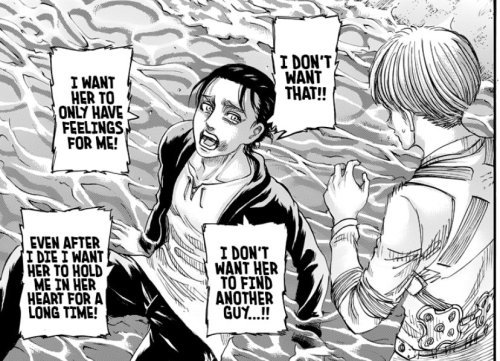
Eren like “CryBaby”
What a slap for the reader to witness such an emotional picture. Yes. Isayama reminds us to what extent Eren isn't a brave knight, not a charismatic hero, not the genocidal demon of this story but a child.. whose weight of Destiny is too heavy to bear. Scan 139 reminds us to what extent we have lost ourselves, just as Eren has in the way, forgetting the very essence of the story that has been told to us from the beginning. It’s not a story of geopolitical warfare, a biological parasite, titanic monsters, a northern deity, or a philosophical-esoteric trip. It's the story of a boy who wants to emancipate himself, to live for himself, tasted of the thirst for adventure, the tranquility of his loved ones but born in a cruel and alienating world that leaves room only for death, abuse of power, betrayal and despair .
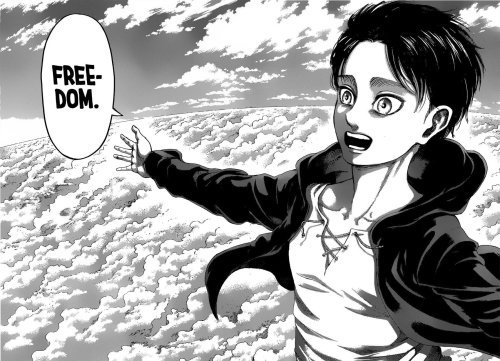
A journey where the child becomes an adult at the cost of his or her life. Learning the most painful lesson… To be an adult is to renounce one’s dreams, to bend one’s knee in the face of the servitude of one’s mortal condition, to be content with one’s cage in order to enjoy the little that one can have at one’s disposal, to mourn those who may disappear from one’s life.
A young boy who dreamed only of freedom, surrounded by people who love him. A child whose inspirations, as impulsive, unreasonable and immature as they may be, will push him to his limits. A child who grew up too fast, who could not mourn his mother, aware of her physical and spiritual weakness, who was confronted with the violence of this world which reminded him of his condition of being insignificant, a pawn on the chessboard of the "Way".
A child whose powers worthy of a God then gives him the possibility to realize the unthinkable, almost the absolute fantasy of every Man : to shape a world in his image, to be as free as a bird flying above the clouds without reddish stain to touch the sky. Move forward, Move forward whatever the price… move forward for an illusion of freedom, for an infantile obsession.
And by assuming the role of the wicked “demon” of tales so that the brave knights can free this world from the evil that eats it.
Lost between the present, the past, the future.. time no longer makes sense. Only finality counts, annihilating its titans whatever the price. They have to pay for his mother. They have to pay for his fallen comrades. They must pay for reminding us of our pitiful helplessness as human beings.
But the Demon also has a heart, remorse, feelings, there are people who attach him to this world. Therefore, what to choose?
Divine Freedom or Mortal Love? The impossible equation... Although Eren may have travelled the road in search of the answer, how can freedom and humanity be reconciled? Free your people and protect your loved ones, though imperfect?
______
He will not find the answer— neither by searching the past of the goddess Ymir, not by consulting the other Titans carriers, not by creating the different alternative realities that led to the same observation… only death can free the bird from its cage, only the death of Humanity is able to reconcile the sublime and the hideous. Or rather, a common enemy that will crystallize all their ills. But who would be crazy, brave enough to accept being the victime ?
Like a Christic figure, Eren will assume this role. But not without having to confide his last wishes, his last secrets that can no longer contain… because yes, the demon is limited by his adult condition of 19 years. Yes.. the child has grown up. Recklessness, impulsiveness, daring in the face of death, the omnipotence of the child leaves room for a teenager who is now afraid of dying, who has succumbed to love, who doubts, who is aware of his weakness.
Eren has finally become a man...in pain. He finally accepts his feelings, his weakness in the face of death that awaits him.
He’s not a running child anymore. The plates are only explicit about this. The power of narration.. we come back to the fundamental of this history, which is human psychology. The feelings, the relationships that unite all people between them. Friends or enemies, men or women, child or adult, Eldien or Mahr... Despite our differences, our disagreements, we are all equal and weak in the face of death... but also in the face of the love we can bring to others.
Yes, Eren is a weak hero. Yes, he admits to loving Mikasa. He admits that until the very end, he didn't know how it was going to go. That he was himself a pawn in the divine game of Ymir. Another puppet at the service of a little girl who is also blinded by her duality, by her toxic love for her executioner. One cannot remain insensitive to this remarkable development of the character of Eren whose death was inevitable. For whoever plays with divinities can only lose his humanity, his freedom too. By the ultimate sacrifice of his selfish and human desires finally. Eren alone became the true savior of this world. He will also have kept his promise to his friends, to the beings he loves by offering them last memories through the “Way”.
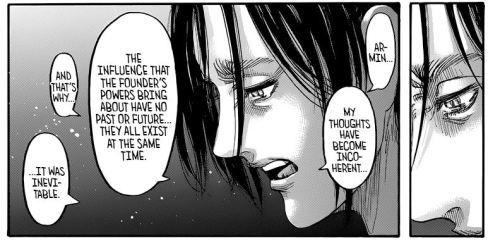
Selfless Love or True Freedom
As Mikasa said: The world is cruel, but also … Very beautiful.
Whoever sets a glance without hatred on the world, with compassion, with love for his neighbor will be able to claim to touch with the finger this Freedom so sought.. a selfless love, not turned to satisfy one’s own selfish desires.
Because Love, like hate, takes different forms.
Love connecting us to our roots, our family of blood…
Love binding two beings who love each other, desire each other, cherish each other, seek each other….
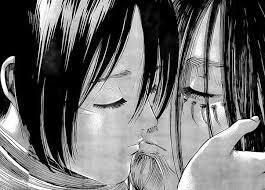
Love that binds us to his comrades, his battalion, his family of choice, his heart…
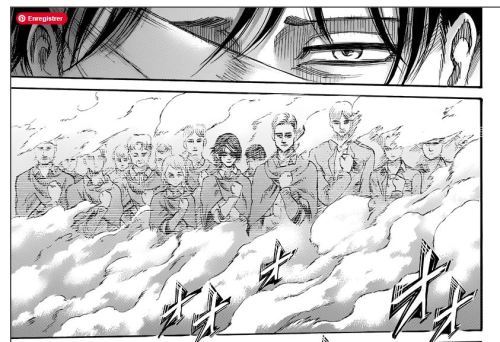
Love that life brings to us in all its forms…
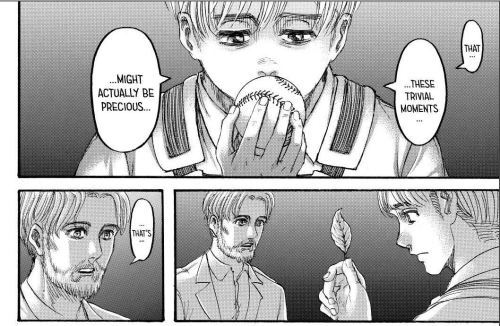
Love… this power that is unpredictable and uncontrollable.
And that can become the obsession of a lifetime. It is by becoming an obsession that love becomes as destructive as hatred, and sends us back to our condition as an alienated Man… locked up in his “Path”, in his cage.
It's by demonstrating resilience and self-sacrifice that man can taste freedom. We can find redemption in the love that others have for him, that we also have for him. For a few hours, a few years…
At the cost of a renewal of the cycle of hatred, because man remains selfish, not all are ready to make sacrifices. Therefore, Mikasa and Eren have made the greatest of sacrifices for the survival of their comrades and the world: they give up their chance to be happy together, sacrifice their desire to be together for the rest of humanity. As in tragedies, the main heroes are victims of Destiny, are those who will pay the price so that others can flourish and live. The children have become adults.
Just as Armin is no longer the whiny little boy to protect. Unlike Eren, he managed to learn from his mistakes, grieve, face his own fears, confess his love to the girl he loves. It is finally he who will raise the wounded little boy, who will comfort him.
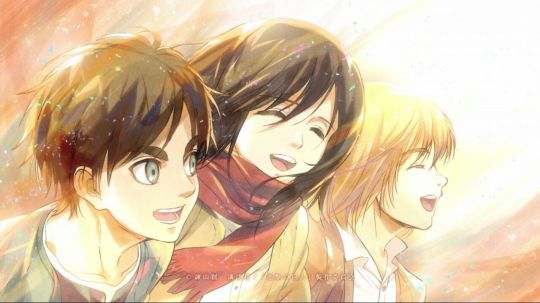
The frustration
Mikasa is the main character of the story. It's through her that awakening is made, it is through her hand that she closes this long journey. In Eren’s memories, it is always central. It is the key, the final solution.
It's his psychological, his emotional journey that we will follow throughout the manga. Eren is only a complement, the character who crystallizes his goals. In a world where men are “dominant”, the woman must bend her knee, support her prince so that the light shines on him. Isayama knew how to play perfectly on this classic code of narration. Whether one agrees or not with the conclusion of certain female characters, the work often highlights the fact that men are only victims of their passions and obsessions.
-------
Only women seem to emerge victorious in the face of the cruelty of the world : they take up arms (Historia), continue to fight in the face of despair (Mikasa), enjoy life and bring joy around her (Sasha), support other women in their emancipations ( Ymir with Historia) question their education (Gaby) disobey (Annie), go against the “moral” principles to survive (Ymir Frizt who continues to love his executioner), sacrifice for the common good (Hanzi Zoe)… But of course… without also paying the price of sacrifice and making concessions.
Historia bears a child of a man whom she does not seem to like but assumes the role of the mother whom she would have liked to have while assuming the heavy attribute of the office of Queen in a country plagued by nationalist tendencies guided by fear. With Eren’s help, she did not give in to the temptation of self-sacrifice but decided herself who she would save or not, what path she wanted to follow. Her desire was to be a mother, a good mother. Whatever the father, it was an indestructible motherly love that she wanted to offer to a child. The one she never had.
Mikasa agreed to kill Eren because, if she had given him another answer, their life as fugitives would have been but a fleeting dream and Eren’s death was inevitable.
Despite her powerful love for Eren (as addicted as he may be, explained by the power of the Ackermans?), she will break the chains of her servitude by killing her only Love. She is the light. She accomplished the journey of a true heroine by demonstrating resilience, by giving of herself for the world.
She had only eyes for Eren.. was open to others, to show empathy, a desire to continue living for other comrades who are dear to him.
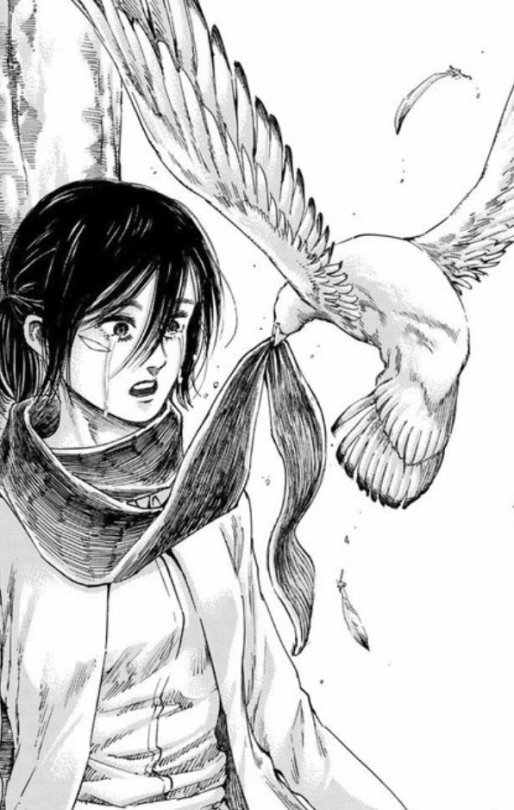
-------
Mikasa also leads the way in Ymir Fritz… you can love a monster, you can be a prisoner of a toxic relationship but you can free yourself from it. One can become free, but the price to pay will be to carry this infinite sadness, this frustration of having been able to live another story if things would have been different. By her kiss, she showed what true Love is.
Although the frustration is present, although we would have liked her to turn the page and rebuild her life, she must also pay the price of her “freedom”, of her “survival”: haunted by the sacrifice of Eren, guardian of her memories, from her grave as if to preserve her existence as long as she can live.
Once again, women show that they are stronger than we think. So Ymir was also able to free himself of his toxic link with the King by making the Titans disappear.
In the image of the bittersweet end of the chapter, which shows us that the disappearance of a monster, of a divine force “responsible” for the horrors, is not the long-awaited salvation.
The vices, the human fears will remain the poison, preventing us from reaching this illusory freedom. Men do not need deities to dig their own way to death.
-----
From "occidental" point of view, it is true that this is a blow to the “strong” women of the work still alive. Reduced to being collateral victims of Love, as toxic as this link may be (Ymir-Mikasa). Reduced to attaching themselves to winning or losing romantic figures depending on whether their love-interests is the villain of the story (Mikasa-Annie). Reduced to their role as mother-benefactor (Historia-Gaby).
It’s awkward, but I think Isayama wanted to show that no one is spared. That no character can claim complete tranquility and sweet freedom.
Everyone has had to sacrifice something to survive, and women and men are equal in this judgment. Women also remain victims in a world that remains dominated also by the cruelty of Men (the human race in general). They are not completely free, they are also trapped in roles.
Everyone carries the weight of his choice. That characters have a duty to remember, to pass on to future generations the horrors they have lived to try not to reproduce the same mistakes. Even if their new life choices are imperfect, disappointing for those on the outside.
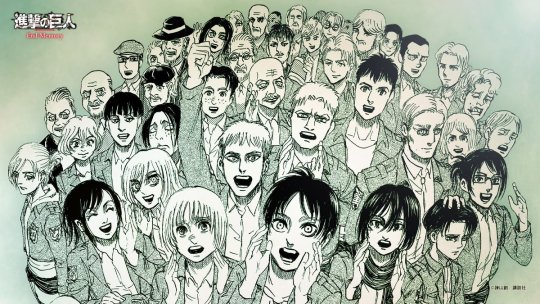
Levi sacrificed many of his comrades to fulfill his promise to Erwin in his quest for truth and to continue the fight for Eldian freedom.
Armin and Mikasa sacrificed Eren: their friend, their love, the dearest being to fulfill their promise to discover the outside world and touch that freedom.
Like Levi Ackerman and his love for his battalion comrades. As for Mikasa and his love for Eren (because she saw the human behind the monster). She has been waiting for a sign for 3 years to see him again in order to follow up on “see you later Eren”.
Finally, a bird comes to give him his wrap. To encourage him to go forward again. To continue to live…
--------
The most free people are those who honestly and sincerely love someone. Those who are able to see the beauty of the world despite its ugliness. Who give without waiting for return. Those who continue to look at the world without hatred, those who do not succumb to its cruelty. Tears are running down…
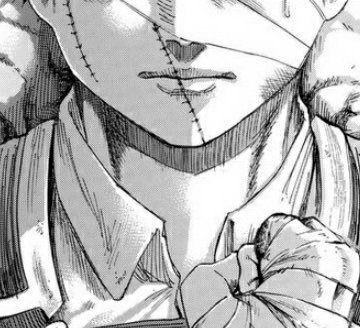
#shingeki no spoilers#shingeki no kyoujin#mikasa ackerman#levi ackerman#eren yaeger#attack on titan#eren jaeger#snk spoilers#snk manga#aot139#snk 139#aot manga#manga cap#annie leonhart#snk ending#aot ending#ymir#ymir fritz#historia aot#eremika#rivamika#aot fandom#aot analysis#snk analysis#historia reiss#thank you isayama#hajime isayama#snk139#aot 139#manga
194 notes
·
View notes
Text
chrysanthemum
1/2 of the fics i wrote for the 10th anniversary zine!! if you haven’t checked it out yet please do @ninjaneverquit-zine , everyone worked so hard and did such a wonderful job, i’m beyond honored to have been included <3
I may not have been in the fandom since the start, but ninjago means the world to me - it’s gotten me through some of the worst times and pushed further in writing than i thought i’d go, and the fandom’s been a particularly bright light in my life since i’ve joined 💕and of course i can’t not celebrate that by writing for the light of my life lloyd garmadon, so here’s me crying over the garmadons anniversary-style :’D
Garmadon’s son has only been on the earth for twenty-four hours, and he’s only been Lloyd for nineteen, but he already finds himself terrified of the tiny, living thing he cradles in his arms.
“He’s so small,” he tells Misako, eyebrows furrowed in concern. “Is he supposed to be this small?”
Misako, who’s been answering questions similar to this for the better part of the morning, rolls her eyes. “He’s fine, Garmadon. He was born a little early, that’s all.”
Not as reassured as he should be, Garmadon returns his gaze to his son. He’s sleeping now, deathly still in his arms, and he resists the urge to wave a hand over his tiny face, if only to feel the small puffs of breath he knows must be there. He brushes a wisp of hair from his head instead, marveling at how pale it is.
“He’s got my father’s hair,” he murmurs.
“I don’t care, Garmadon, we’re still not naming him after the man.”
It’s Garmadon’s turn to roll his eyes. “I never said that. I said Montgomery was an unacceptable name to burden my son with.”
“Oh, your son.”
He misses the rest of her retort as Lloyd fidgets briefly, tiny features screwing up as he shifts. A flash of lightning from outside brightens the room, and Garmadon pulls Lloyd closer reflexively. The thunder crack follows soon after, and Garmadon flinches, the thick smell of rain filtering through the open windows. He can already see thick droplets sliding down the hydrangeas Misako’s growing in the windowsill, drowning the pale flowers. It’s been pouring all week, typhoons hitting the coast with gusto as they always do this time of year. Garmadon doesn’t like it — his son is much more suited for the sun and all its brightness, not the grey-skied downpour of thunderclouds.
Lloyd hardly reacts to the downpour, having gone still and silent in his arms once again. Garmadon’s heartbeat quickens. He shouldn’t sleep this much, should he? He doesn’t remember Wu being like that, but he was so young when Wu was born, and it was so long ago, and he can’t feel for Lloyd’s breathing now because the breeze pouring through the window’s too strong, and—
A soft hand sets on his shoulder. “Here,” Misako sighs, guiding Garmadon’s hand to rest gently over Lloyd’s chest. “Feel. That’s a heart, going strong.”
Despite his hesitance, a deep-rooted part of him still desperately afraid his touch might hurt something so small, Garmadon does so. Lloyd’s heartbeat is rapid and as fragile as a bird’s wing, but undeniably there. A small, living thing.
Something warm curls in his chest, and Garmadon thinks he might understand his father’s delight in creation — in things that live.
Not, of course, that his father has ever created anything so perfect as Lloyd, but Garmadon can credit him for having tried.
* * *
It’s weird, having a dad.
Not the concept of having a dad — Lloyd’s bragged enough about being the son of Lord Garmadon to at least get that part. But actually having him here, a living, breathing person who looks at Lloyd and cares—
It’s weird, that’s all. Not that it’s a bad weird.
“You need to wrap your hands, before you go hitting things like that,” Garmadon scolds gently, twisting gauze around Lloyd’s bruised, swollen fingers. “The others can show you how, for training. They should have shown you earlier.”
Lloyd bites his lip. He doesn’t tell his dad that the bruises are less from training, and more from pointlessly banging on bars in an attempt to get on Pythor’s nerves. It sounds silly, compared to the way his dad swept in like a big hero and took out all the snakes in single swipes.
A big hero. Lloyd wonders if the others will ever see him that way, too.
His hand twinges as the gauze pulls tight, and Lloyd sucks in a sharp breath. Garmadon flinches, drawing his hands back.
“I’m sorry,” he says, quickly. “I keep forgetting — you’re so small.”
Lloyd makes a face at that. Small? “I’m not that short,” he grumbles. “I’ve grown lots.”
“Of course you have,” Garmadon amends. “I only—”
His expression twists, and Lloyd’s stomach drops. There’s that look again.
“I’m sorry,” Garmadon repeats, sounding downtrodden.
Lloyd purses his lips. For all his bragging, he’s never really thought much about whether he likes his family or not. It’s hard, when you don’t have one around to like. Watching the way his dad worries and his uncle walks around all stone-faced now, Lloyd’s not sure he should like it. He likes Uncle Wu, of course, and he loves his dad, but—
He hates the way they all walk around like they’re preparing for a funeral. His dad’s funeral, his funeral, whichever it ends up being. It’s stupid. Lloyd’s lived on the streets for months, and in Darkley’s even longer. He wouldn’t have minded walking around like he’s doomed for misery then.
But now? When he’s got people who care, and a family?
Lloyd sets his mouth stubbornly. He doesn’t know much about destiny, or the prophecy, but he knows he’s not about to lose this. Not when he’s come so far, when he’s so close to having — to being someone worth having around.
No funerals, Lloyd promises himself. He can see this prophecy through — they both can, the two of them. You have to be alive to be a family, right?
“It’s okay,” he finally replies. “I’m alright, dad.”
And he’s gonna stay that way.
* * *
When Garmadon had thought about the final battle in the past, he’d expected the darkness. The destruction, the pain.
He hadn’t expected to survive.
“So you’re really giving up fighting, then?”
Glancing up at Lloyd, taller now yet still small enough to not quite fit his bright golden gi, Garmadon finds survival a very welcome surprise.
“Yes,” he says, returning his gaze to the flowerbeds Misako’s helped him put in the monastery garden. They’re coming along well, despite the recent fits of bad weather, and they do a fine job of making the monastery look homey. Unthreatening.
He hopes, at least.
“I think I’ve done enough fighting, for my part,” he continues. He gives Lloyd a wry look. “I’m not sure Ninjago could take much more of it from me, anyways.”
“I dunno,” Lloyd says. “It’s been getting pretty boring.”
Garmadon snorts. “Boring is something you should appreciate, son. Excitement isn’t always good.”
“No, but it isn’t bor—dull,” Lloyd mutters, crouching down to study the flowerbeds. Garmadon shakes his head in reply, sighing. He remembers being his son’s age once, yearning for the next thrill, even if it feels ages away now.
He’s got a whole lecture on appreciating the quiet moments on the tip of his tongue, too, when Lloyd speaks up again.
“We used to have these flowers at Darkley’s,” he says, tilting his head as he studies them. “Some of the boys tore them all up and threw ‘em at the window, but they were pretty before that."
Garmadon bites the inside of his cheek, his eyebrows furrowing. His expression softens as he spots the gentle way Lloyd handles the flower, carefully pushing it back to place. It never fails to baffle him how someone as gentle as Lloyd could’ve come from his beginnings, much less from Garmadon, but he treasures it.
“Snapdragons,” Garmadon says, instead. “Fitting flowers, for our family.”
Lloyd looks at him curiously, eyes bright with the light of suspicion, and Garmadon is tempted to tell him the full truth, then and there. But Lloyd is still so young, innocent and naive and barely come to terms with his place as the Green Ninja. The truth of their blood is a heavy one, and Garmadon can’t find it in himself to lay it on Lloyd’s shoulders today. No, his son is happy among humans, so a human he’ll let him be. Someday he’ll know he’s more, closer to the dragons he admires than he realizes, but not quite yet.
Miraculously, Garmadon has the time, now.
“If you stay after dinner, I can show you how they’re planted,” he offers. Lloyd nods, and Garmadon’s smile widens.
Destruction is in his blood, and he’d be blind to say it isn’t in Lloyd’s as well. Power is power, whether it’s bright and beautiful or stained in darkness, and Lloyd could shatter mountains as well as move them, if he wanted.
But Lloyd never moves to pull the flowers up, only watches them rustle slightly in the breeze, leaving them to grow a little bigger, a little brighter. Garmadon, for his part, watches his son, all bright eyes and the burnished gold hair of his grandfather, and reminds himself that one needs not be a master of creation to appreciate life.
* * *
Lloyd likes to think of himself as an optimist, for the most part. He’s at least good at pretending that he is one, with how many times he’s had to convince himself it’s worth it to get back up.
Right now, he’s trying to remember how he’s ever managed to convince himself, because this time, getting back up seems impossible.
Lloyd used to wonder, back during Morro, how far you had to push yourself to break like that. How far someone had to push you, to truly splinter. He thinks he might have found his answer, though his is less of a bitter hatred and more of an empty abyss of hurt.
It hurts to breathe. That would be a sign that something’s wrong, if Lloyd didn’t already have about sixty other signs that he’s in trouble. But the breathing thing is sticking out to him especially, right now. His lungs feel like they’re scraping against his ribs every time he tries to draw breath, bruised and stinging, and there’s a deep ache in his chest that grows worse by the minute.
He tries swallowing again, sand scraping down his throat as he does. He hisses out a breath instead of coughing, almost frightened that his lungs will give out completely if he does.
He says almost, because Lloyd isn’t sure what emotions he’s got left to feel anymore.
A lie. Pain starts numb, sometimes.
Lloyd’s chest spasms as he sucks in another breath, and he wishes the desert would swallow him whole. His father — his real father, who pushed him from the Cursed Realm and told him to return to light and living — would want him to stand back up. He’d beg him to, stress the importance of continuing on, of persevering. Stuff like that.
But if it wasn’t for his father, Lloyd wouldn’t have to get back up in the first place. If it wasn’t for his father, Lloyd wouldn’t be—
His eyes burn, stinging as he squeezes them tightly shut, and he tells himself it’s the sand.
Instead, he focuses on the ragged beat of his heart. He only knows it’s there because his chest throbs in pain with every pulse, but he latches onto the feeling and holds tight.
Still alive, he tells himself, even as every bit of him sings in agony and his lungs scream at him to stop. He’s still alive. His powers aren’t answering him but they will, he knows they will, he can’t disappear like he did with Morro. He can’t — he can’t leave it, not like this, not with his father — not like this. If he can’t stop Harumi, if he can’t save his father, if he can’t do anything else at all, he can at least do this.
Stay alive. Stay alive. Stay alive.
He’s never realized how long the nights out here are, before.
* * *
After everything, the light dies down and the Oni vanish, and Lloyd’s heart stops.
It shouldn’t be a surprise to Garmadon, who isn’t even sure his own heart beats now, but it is.
It’s not supposed to stop. There was a promise made, somewhere, to keep it beating.
It restarts before he has the chance to process what that even means, and the swell of relief is so foreign, Garmadon leaves before he even has the chance to ask Lloyd what he’d seen. He thinks to himself, that will be the end of it. The end of whatever tentative connection he has with the boy, whatever frayed and tattered threads of something they once had. Better to cut them away for good.
Lloyd’s not one to let things die, though. Garmadon should know that at least, the boy tells him.
“I know you like repeating yourself,” he mutters. “Letting go is different.”
“That’s not what this is,” Lloyd huffs back.
Garmadon rolls his eyes, the two of them drifting aimlessly down the Ninjago City garden paths. It’s secluded, the rest of the city still recovering, and Garmadon’s grateful for the quiet, even if it is awkward. Building any kind of bridge with the boy is difficult, if only because Lloyd stresses that they’re rebuilding a bridge, and Garmadon has no memory of any bridge to begin with.
He’s still sifting through jumbled emotions, sorting out what his place in this world was and is supposed to be, but he knows that the word son slips easier from his mouth than daughter ever did, so he figures he’s on the right path, at least.
“It’s about—” Lloyd pauses, his expression contorting. “It’s about surviving, I guess,” he grinds out.
Garmadon’s mouth curls into a grin. “Really. You were quite…vocal, that it was about more than that.”
“It is, it’s just—” Lloyd cuts off again, stopping them in a half-ruined section of garden still littered with remnants of concrete. “It’s the payoff, you know? Here.”
He bends down, brushing dust from a surviving scattering of flowers. He gently touches the edge of a petal, pushing the flower head toward the sun. “See?” he says. “After all that, it’s still alive.”
Garmadon stares at the delicate edges of the petal, smaller and more fragile than any of the buildings that crumbled beneath his rule. At Lloyd’s nod, he stretches his own fingers out toward it, his hand impossibly dark and calloused next to his son’s own small one. But he brushes his fingers over the petal edge nonetheless, almost surprised that it doesn’t decay beneath his touch. It’s soft, he notes, like the fragile skin of a newborn. Odd that it should’ve survived, out of everything else that perished.
“So it is,” he says, carefully. Lloyd says nothing, but there’s a ghost of a smile around his lips. They must make an odd sight, the pair of them crouched in the dirt in the recovering garden. There’s no use in sitting here and looking at the flower, no explanation Garmadon can offer himself, but he doesn’t leave. He can take the moment, he decides, to appreciate what Lloyd is trying to show him.
They too, after all, are still alive.
278 notes
·
View notes
Text
1000 Stars Ep 1-6; Tian and the Consequences of past mistakes.
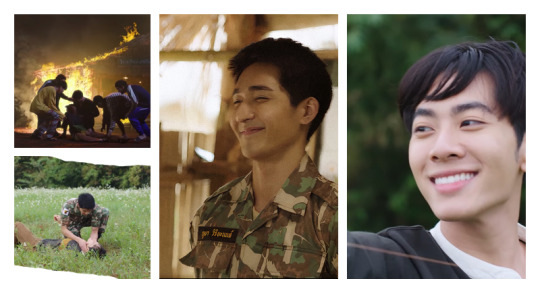
This has been long coming. I’ve just been very weirdly conflicted with writing about this show because I tend to find speaking about it for hours more appropriate. But because I didn’t have time to create a video focused on this topic, I decided to write it out the way I know how. First of all this has been just an insane experience, this show is... well how can I describe it? It’s incredible, and not like the oh this is really good incredible, I mean like it’s mind blowing how outstanding this show is, the fact that this show is the first Thai bl show of 2021 that was original is blowing my freaking mind, it’s put a standard to everything else, it’s standard is excellence, there is no mistake, no errors, no issues with this show unless you’re someone who loves to find something wrong about something. This show is so inspirational, representative, deep, and important in this genre. First of all it’s a unique type of storyline, it has meta everywhere, it’s incredibly filled with dimensional characters that are so human and real and make mistakes but learn and grow, and it has an incredible realistic love story brewing. Like what else can you say about this show? The cinematography? Excellent. The directing. Even more great. The acting; So incredible. Everyone who has joined to make this show mean something, mean something to me. Because this show is now my hiding place, an escape from the realities of the world, and the grim aspects of life, a show that makes me learn about the value of life, the importance of love, and just the inspiration of finding meaning to who you are and why you should be here. This show is so incredibly written and planned with so much effort, direction and energy. If GMMTV can keep on with this energy with all their other BLS this year is going to the biggest, greatest breakthrough for this genre. This show makes my Fridays. And I wanted to first start with that because it’s hard to write thoughts about this show, because there’s so much to flesh out and explain, every scene, every dialogue, every thing means something to the overall story brewing, to the subtext hidden, to the themes and messages the show is trying to teach. Everything can be explained. And I think that’s so incredible.

So what do we have in this essay then, we have a focus on Tian, and his actions from Ep 1-6, it’s incredible how our little sunshine is finally going through self discovery and finding who he’s meant to be, also it’s just amazing to see him find his soulmate through all of this; who just means so much to him and influences all of his greatest things in life. However this show toes between the line of a really sweet love story, with some humour, some laughter, some cheesiness and flirts but also a darker, sadder and realistic portrayal of some issues in the world, and also some parts of the human psyche that represents or relates to us in some way. Whether this show is about how easily depression can make us fall into this well of self hate, and self destruction, or make us forget the value of the people around us and the value of even our selves, or this show is a message and warning to consequences of recklessness, corruption and selfishness, this show has so much to say and show whilst still presenting it in a format that’s a BL; that’s still hopeful and beautiful and sweet. And how Backaof has gone and done this is incredible to me. This essay is going to be breaking down each of the hints and clues that point to the serious aspects of the show, what are we to expect? Why is this a repeated theme in the show, what does it mean for our characters, what does it mean for us? So Let’s break down the foreshadowings and clues to the plot twists in the show that’s upcoming and how Backaof has laid a very meta plan for each of these clues to take place.

Tian and The Consequences of The Past
Mostly episode 5 really is the episode where these clues are hidden in subtext. So much is troubling immediately we begin the episode. We start of with a realisation that we’re being bamboozled, the show is hiding information from us, it’s twisting our perspectives on certain storylines and there’s still truths that we need to unveil to piece together. The most important connection of this story is the demise and removal of Torfun. In fact her accident is the catalyst that causes this story to begin, she’s a guide to Tian to lead him to this new renewal of life, and purpose but also she’s the family and friend to many people who have been touched by her presence, she’s also the person connected to our love interest. In so many ways her demise means a lot to the plot of the story. And it’s shocking to think that there could be more to it. It’s not just this plot that is a convenience to the story, it means more, it’s connected to every single thread of the plot, connected to the love story brewing, because it’s her heart that’s being confused at first with Tian’s feelings, it’s her presence that’s being emphasised on with Tian’s guilt of replacing her, it’s her words that’s being valued by Tian to want to be better and do more for himself, but it’s her mystery that keeps us all on edge including Tian who is slowly unveiling memories that he doesn’t want to accept. It seems like deep down Tian knows something is of about Torfun’s accident, it’s like he can’t rest, he can’t help shake when he questions his flashbacks, his memories, there’s this desperate need for him to attempt to make it up to her, to ensure she’s happy and rested with her wishes coming through, it’s such a desperate need it drives him to self sacrificial methods, he completely leaves his own needs and care for her goal to be realised.
And it is sweet but Tian is also someone who is incredibly hurt, and destructive, he’s been so pushed into this mindset of thinking he’s not worth it, his life is not worth it, his presence is not worth it. For so long he has been shackled by the idea of deth (wrong spelling on purpose) following him all around, one day he was meant to leave the world, unexpectedly, no hopes, no dreams, no freedom from this and so he became numb to this premise of life, of value, of self care. Tian is incredibly reckless and self destructive because he lost the meaning of why he should be self protective and self loving. And it breaks my heart everytime we have to relive or even remember his state of mind in the past episodes from 1-4. Now this begins to change once he settles and realises he has meaning, and he’s needed and he’s worthy. It starts to change when he realises he wants to be protected by the man he loves, it starts to change when he’s found something to protect, his new family, friends and lover. It starts to change when he also wants to make a difference and be of importance. So Tian is finally going through this self discovery of Purpose, Love and Happiness, which are all connected to this meaning of life, that he wanted to uncover when he read Torfun’s diary at first. But as much as he is on this path, he still has remnants of his mistakes and his past mindsets that prevent him from moving forward, it eats him up with guilt, it paralyses him with fear that one day he could lose it all, but also it makes him run into the claws of danger and deth time and time again. So Episode 5 really is a map of all the dangers that Tian has to get through, connected to his own faults, flaws and development needed to be unpacked to get to his destiny/fate with Pupha. These worries and foreshadowings show a grueling yet important journey to overcome, he needs to overcome his self doubt, his self hate, his numbness to life and his guilt and shame of the past. So Let’s analyse and break down these clues.
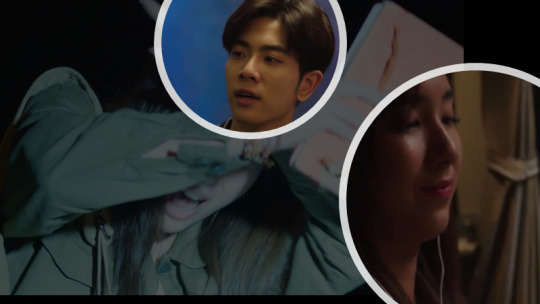
Consequences of Recklessness
Episode 5 starts with immediately a shift, it’s a plot twist to see that Tian didn’t faint. It’s odd for me to be watching this scene in the beginning and screaming Faint please faint, why isn’t he fainting. Immediately he stands up assures Tul he’ll be okay and then proceeds to discuss about his car as his baby and pride, you know it’s a problem. The emphasis of Tul feeling uneasy brings up this worry that Tian is about to attract trouble through his lack of care for himself, and his lack of value for others and things connected to him. This is the moment we’re hit with the wave of realisation that Tian may have to deal with the consequences of his recklessness, and that means that this event is connected to the source of everything the one thing we still have questions about; Torfun and her accident. And it’s a terrifying lesson don’t get me wrong, but it’s like Tian to be reckless, he’s reckless about everything, his life, his heart, his self, he’s just constantly putting himself at risk.
Immediately he opens his mouth and pushes for an illegal car race, we know there’s going to be consequences, this is connected to how powerful he is, (they can close the road and cover up the truth), this is connected to how corrupted his background is as we’ve seen in episode 1, how little they value others for themselves, it’s connected to the ease and way he can be privileged and thrive of chaos and get unscathed whilst people like Torfun end up victims used and forgotten. Now I’m not saying Tian is the actual person who took Torfun’s life, although he does end up in possession of her heart, he doesn’t drive and I do believe he wasn’t the one in the car, maybe in the passenger seat next to the driver, or maybe hitting another car from behind that ran into her, or Tul managing to get him out of that situation before he could be the one who caused it. But it’s still his words, his actions that lead to this accident, and that’s a terrifying fact both he and the audience has to deal with. And this is connected of the value of life and people and how this can be lost with recklessness, and corruption and selfishness.
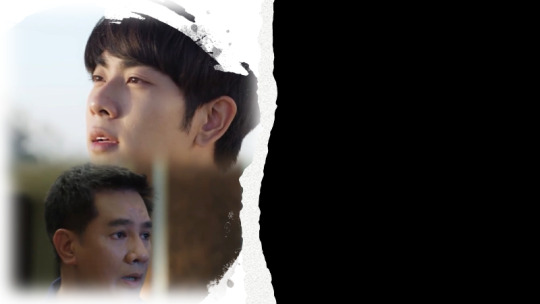
Consequences of Evasion of the Truth
Tian literally had to evade and run away from this world to go to the village to find the real meaning but it doesn’t erase his past, he has to deal with that, and I do think he will think he’s the one who is the person at fault mostly because he’s starting to get flashbacks of that event, he knows he’s hiding a secret and It’s more than just the fact that Torfun gave him his heart, it’s because deep down he’s scared he was involved in that in a different way. And this leads to Pupha and his secrets, the way he was actively trying to conceal the truth in episode 5, because of his fear of losing it all, and hurting the person he loves. The fact he’s hiding secrets means that those secrets will come to light and we do see an example of this a bit less painful when Longtae stumbles on Torfun’s diary, this is still going to be happening because Pupha still needs to know the truth and the way Tian has covered up the secrets and truth for so long means there’s consequences to hiding the truth.
This is also another theme of the show, connected to the fact that Torfun’s accident is being covered up as just that, connected to the fact that maybe Tian’s father and mother tried so hard to evade the truth and move on and pretend nothing happened, by selling the car and forcing Tian to not think about looking for her. That’s why it’s worrying because the parents are obstacles and in my opinion are also one of the hints episode 5 leaves for us the audience to notice. Already it’s uncommon to hear that Tian’s mum isn’t as worried about him in the village, when her love for him in episode 1 is suffocating and protective, she won’t be okay with his choice to be reckless, to push his heart, to come to a place with distance, and so it’s a red flag.

Consequences of Corruption and Power
It’s a warning, his parents are connected to a plot twist, they’re going to be an obstacle because they represent right now Corruption and Power. And the consequences of corruption and power removing the value of life is also shown in episode 6 when we see our villain Sakda. In fact it’s because Tian tries to evade Corruption that we see the value of all the villagers earnings, work, life, burn so cruelly at the end. Sakda’s cruelty has no bounds, he doesn’t take the people seriously; he sees them as liabilities, obstacles, unimportant, he doesn’t value them just like Torfun was also unvalued by her aunt because of money/recklessness and also probably by Tian’s family because of corruption and power. It’s all about the darkness of privilege; the very lesson Tian is learning about and also growing away from. Episode 1 shows the stain of corruption in Tian’s life, how it suffocates him and makes him feel unsafe and unhappy in his own home, how it shrouds him in the dark compared to Torfun who found light in Pu Phan Dao. And that wine stain on his chest that carves the same length and shape as his scar is a reminder that he’s been stained and affected by that Corruption. And that’s why he tries to escape and start anew. But there are consequences and lessons of forgiveness he needs to learn, a way to relearn about his own meaning and value but also a way forgive himself and Torfun to find peace with the truth unfolded. Okay so a bit dark but this is a theme, the way corruption and the rich and power don’t care about the value of life, even in Pu Phan dao, Phupha is tagged with protecting the home, the trees, the forest because they have value, but the rich come and poach and cut down the source for the people, they misuse and scam the people because they don’t know or treat what they do as valuable. That’s why Tian as he learns about value finds a way to help the villagers regain the value of their tea leaves and more, he adds innovation and a creativity to everything to make the villagers be strong enough to know their worth and yet the rich and the corrupt manage to burn it all down in episode 6. The theme is recurring; the question is how do we come out of it with forgiveness, peace and understanding.

Consequences of Carelessness
I can talk about this theme and the value of life linked to this show for ever. But there’s more shown in episode 6 that hints at the worrying obstacles we still have to face. There’s Social media mentioned, Tian repeatedly warns Tul to not take a photo of him, he lies to Nam about his facebook and he finds Torfun through facebook in episode 1. He’s so desperate to hide his past and his truth that maybe that’s how some of the truth will be unveiled. Social media can be easily tracked if a person has it out for him, but also Tul takes a picture with him that holds such a warning to it, it just seems important to notice as well. Because it could be Sakda who unveils it but he’s also connected to so much more.
His power also puts Phupha at risk, because Phupha is the one tasked with preventing these type of influences hurting the village. Phupha’s job requires his life to be at risk for the value of others, the people he deems family, and the place he deems home so his job is going to also lead to him being at odds with Sakda and his minions. Especially since we have seen how violent they can get, and in episode 1 we are shown a bunch of people who are currently a danger to the forest with one escaping and boss connected to them. That’s Sakda. So if Phupha has to stop Sakda his life may be in danger as he risks it for the village but also mostly Tian who is the target of them now.
Again that’s the consequences of Tian’s recklessness because even though it was good for him to defend the village and do what’s right, he was warned repeatedly what it could bring. And it brings Phupha’s life in danger. Especially the foreshadowing with him running in episode 6 to bring out a symbol of Phupha’s presence in his life. His actions have unfortunately led to the endangerment of the one person he wants to protect more than himself. The one person who truly shows him the value of life. That’s why episode 5 jokinly repeats also warningly that Tian is a trouble magnet, it’s a joke because it seems him being reckless and attracted to trouble is not important because with his status and privilege he can come out unscathed, however it can lead to catalysts of drama and more pain in the future. Hence again the consequence of recklessness. Tian acts before he thinks, it’s a good and bad quality, first it leads to him being brave, being determined, being creative with how he tackles solutions, it comes to him immediately at the same time packed with his self destructive mindset, at times it leads to him causing trouble and harm. This is why I say another theme to his self acceptance journey is forgiveness this is not just him learning about the best things in life, it’s also about him embracing the mistakes of his past. Because it’s only if he learns, will he become his best self, the one that loves everything about himself, and the one that can move forward and heal past scars. Also because I’m sure people are like what about Torfun our victim essentially, I think Torfun is definitely making Tian also feel this uneasiness and determination to unfold the truth for peace, she gives him permission in the episode 1 for him to take over her heart, to take care of Pupha but probably also to take care of the village. I think she’s at peace but you know we’ll see if the show mentions her again in a different manner.
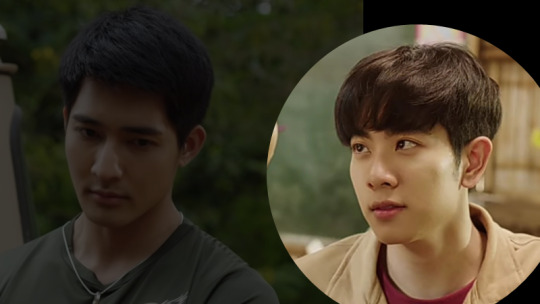
Consequences of Insecurity
But this brings us to the next obstacle mentioned in Episode 5: Torfun vs Tian. Head vs Heart. Especially also connected to Phupha. From episode 3-6, Pupha and Tian have given their hearts to each other, in subtext it’s really obvious they both know how they feel however it’s always distracted by insecurities, logic, and questions in their minds. There’s a lot in their heads they have to deal with that makes it hard for them to confess. Although Tian is basically still willing to fight over those thoughts and choose him and show him he’s open. This is why I don’t think Tian fully thinks it’s him behind Torfun’s incident, mostly because if he truly thought he was behind the car he won’t let Phupha near him. He won’t forgive himself to even let love in. So I think he has inklings something is not right but he pushes down and isn’t fully aware of what happened that night. But apart from those worries, there’s more things he and Pupha deal with that is hinted in episode 5 and we see is preventing both of them just coming out and saying what they feel.

The things in Pupha’s head vs heart
The first worry which he kind of removes in episode 6 is distance. Phupha says it in episode 5, he doesn’t want to be the reason for why Tian stays in the village and not return back for his degree in college. He doesn’t want to hold Tian back though he’s worried that him returning means he won’t come back to the village. Infact Tian returning home has been Pupha’s biggest fear since he first met him, it’s why he teased him harshly each time he saw him pre ep 3, because he didn’t want him to leave so he always angered him and tested to see how determined he wanted to stay. Because of this looming distance/long distance relationship that could occur in the future, Pupha shies away with his other insecurities and prevents himself from confessing rather keeping their relationship in this unknown stage than facing the reality of what they are. He doesn’t want to get in the way of Tian’s potential, it’s obvious Tian is finding Purpose in the village as a teacher and helper but for Pupha where people of the village dream of going to the city to get their dreams, and live a better comfortable life it’s better for Tian who’s frail, and smart to go back and unveil his potential by staying in college for however long he has to.
But also Pupha notices Tian is secretive. This is why although it seems Tian is open to him and obviously flirting and hinting at a way to elevate their status, Pupha shies away because he has insecurities, one he still doesn’t trust how Tian sees him, there’s this idea of him being different to Tian because of age, personality, and maybe even sexuality, and he worries about all of that, what if Tian is more matched with others his age, and finds more happiness and comfort with people who speak like him and act like him, what if Tian hates strict and moody people, what if Tian isn’t queer? These are the insecurities he battles with in his head even though his heart thinks Tian may reciprocate.
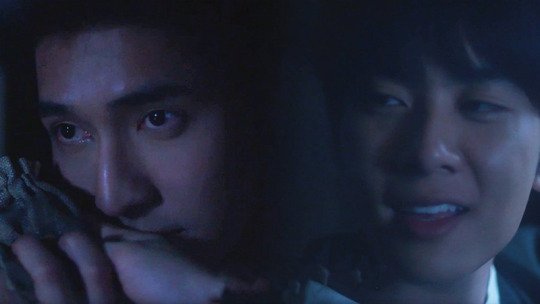
The things in Tian’s head vs heart
And we know the big one for Tian is Torfun. She’s Pupha’s prized, valuable connection, someone who really meant the world to him, someone he and the village is struggling to let go of. Tian feels like an impostor holding her heart, it fills him with guilt, shame, worry about him not being worthy enough to replace her, but also to help them deal with her demise. And For Pupha especially who doesn’t have a lot of family members; who cherishes every single thing as like the most important valuable thing, he doesn’t want him to be hurt with that realisation. He doesn’t want him to compare Tian with Torfun, he doesn’t want to always see the hurt in his eyes when he looks at Tian and misses her.
It’s also the fact he’s been lying for so long, and so that worries him even more as days go by, because he lied (as his subconscious of Pupha told him in the dream In episode 4) it makes it worse, he should have just told them immediately to take away the betrayal and the hurt. So this is all also in his head. Before he accepted his sexuality he also questioned if it was her who loved Pupha not him. Because sometimes people say things to him that makes him feel again like she’s there controlling him, or changing him to become like her etc. It’s hard for him to not think there might be a chance he likes Pupha because it’s her not him. However the most important one is the guilt of holding her heart, of basically stealing her life, he basically took the guy she loves, the job she loves, the place she loves and replaced her. So he’s not really particularly comfortable with that truth; in fact this is the reason why he’s desperate to make her wish her come through to give her some sort of validation and make her still have meaning. To also ask for her forgiveness for being the one who took her heart. That’s why I think if he’s any way close to her demise as in the accident the guilt and determination to run to the cliff and just beg her for forgiveness is even more desperate and intense. That’s what I’m dreading. Because the journey to the cliff isn’t an easy one, and if Tian desperate and reckless runs away to go make it happen what happens to his already overworked heart?

Consequences of Deth
And that’s the last thing we really have to overcome in the show, the closeness and link to deth both our characters have, like it’s insane, Phupha’s life is constantly in danger, and episode 5 reminds us of the violence of people like Sakda he has to face. Meanwhile Tian is just close to it because of a chance of his rejection, luckily episode 6 reintroduces his medicine and now Nam knows the truth, his heart may finally be taken care of well, but there’s still a chance that he’s pushed it too far, there’s still a connection to his numbness of life, and his self destructive way he sees himself when he’s filled with guilt and pain. So there’s still this tangle with this, which is worrying as we saw in episode 5, his heart is pushed so many times over the limit and in episode 6 even more when he runs into the fire forgoing his own safety yet again. So that is important to note. However I think this is just probably going to be more of a warning for Pupha though Tian’s life is also endangered by Sakda since he’s a target so it’s both, they’re both again in danger of sacrificing themselves to help the other. This doesn’t mean a sad ending I don’t even worry about that, but it’s an obstacle, it’s a consequence of the themes of the show, and another lesson for Tian to learn and grow from.
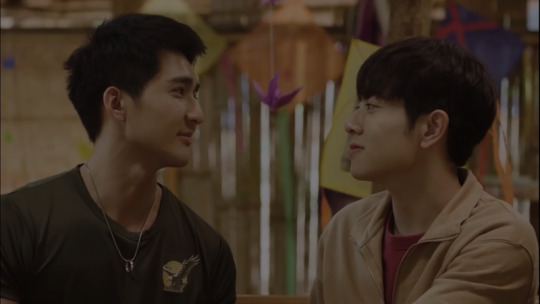
The themes of Identity, Self love, Purpose and Renewal of the meaning of life all are lessons that Mr Tian needs to learn as he discovers himself through the show. However Tian’s past doesn’t just disappear as we see mechanisms and mindsets constructed from his past environment, situations and hurts can show up as consequences, but this doesn’t mean it’s the end of the world for our couple, in fact it’s opposite, it’s a healing message of embracing your past and healing your scars, and becoming a better person knowing you’re still worth everything good despite your mistakes if you’re willing to grow and change. Knowing actions have consequences but you have a chance to learn from them and grow. It’s a self acceptance and self-forgiving journey, to embracing your fate and finding the meaning of life again. So yes in this show there’s a reason for why the characters act the way they do, there’s a reason why Tian constantly puts himself in harms way, a reason for why Pupha is the opposite and is strict and filled with order to prevent recklessness, to protect the value of people, life and more. Both Tian and Pupha come into each other’s lives to offer perspective, to help each other grow, with making Pupha embrace vulnerability and weakness of himself, and to make Tian embrace meaning of life and purpose and love; all the things he thought he had lost. So yeh Episode 5 was a rollercoaster, I kept on smiling but then worrying each time below the surface another clue popped up showing we still have a lot of obstacles to deal with. But if we don’t have these obstacles then these real life messages and call outs won’t matter, we need to see the price of privilege, we need to see the consequence of recklessness, the selfishness of corruption and how it can bring harm to others, we need to know why it’s important to value your self, and know your truth, and fall in love, So we’ll be fine, this show is incredible already and it deals with everything well. No matter what theories we have Backaof has a full map for how everything ties together in his head, how Tian deals with his guilt, how he confronts his parents, how he chooses Pupha overall, we’ll see it all unfold. It’d be a journey, sometimes painful but we’ll come out smiling. Anyway here’s the analysis of the consequences and dangers in the show. Let’s discuss? What are your theories? How do you feel about the show? Let me know. Ciao.
#1000 stars#1000stars#atots#tale of a thousand stars#tale of thousand stars#thai bl#bl series#bl drama#cwg#fvete#earthmix#phuphatian
71 notes
·
View notes
Text
Heaven Sent, Hell Proof - Three

Summary: An angel named Keigo is assigned to win over the soul of a mysterious woman for heaven. He quickly finds that he is not the only one with his eyes on her. Can he get to her before his arch rival does?
Pairing: Angel!Hawks x Reader x Demon!Dabi
Rating: E+
Word Count: 4.4k
Warnings: Virginity loss, vaginal/anal fingering, vaginal/anal sex, oral (fem receiving), multiple orgasms, unprotected sex, double penetration, dubcon, very slight mention of noncon thoughts, some dirty talk ig, dabi's peen is pierced to hell and back, a bit of brat!hawks.....I think that's it.
Notes: Ahh it’s finally here! I’m surprised my estimate of 10k was correct. Usually I misjudge word count by like...a lot. Anyway, some mild warnings so please take care. Thank you for your patience! I wrote most of this in one sitting last night so I could get it out today. I’ll be working on chapter fics and my incubus!shouto request next!
Part One → Part Two → Part Three
“You’re going to what?” Keigo asked, sharp eyes wide and cheeks dusted a light shade of pink. The nephilim tucked into his side was suddenly torn between embarrassment and excitement. From the first time Dabi kabedonned her against the wall in the bookshop, she had been having fantasies about them both. The angel with how protective he was, the demon with his capacity for cruelty...Two very different sides of what was essentially the same coin.
“Having sex will make you both impure. Feathers, you’ll lose your wings and our cute little halfing will no longer be a ward of heaven. She can seek refuge in hell with me and my company. I’m sure my captain will be very pleased to have her. She’ll be safe there from destruction, you both will be. You know outrunning my father is improbable. Outrunning her father? Impossible. You can’t beat Toshinori without a little help, and in order to get that help you need to fall, got it?” Dabi said, growing aggravated with him.
Hawks looked down at the girl in his arms. Their eyes met and she nodded her head slowly. “Please, Keigo,” She murmured, “Do it for me?”
He couldn’t deny the impure thoughts that had invaded his mind since he first met her. The animalistic drive to keep her safe and make her his. He had thought maybe he was getting sick (did angels get sick?). Perhaps this was his destiny. Maybe he was never meant to remain a servant of heaven. All he knew was his heart and soul were telling him to give in. Give in to temptation. Give in to sin.
“Okay baby bird,” He said softly. So soft that Dabi could hardly hear him. “I’ll do it for you. But I get you first. He can wait his turn.”
Dabi barked a laugh, “Oh, no no no. I’m going to take you while you take her. It only seems fair to get it done in one go, right? Why should I sit out while you two have your fun?”
“There’s no way you’re fucking me, you half burnt freak!” Keigo snapped at him.
“Sorry, but those are the rules. You gotta fuck a demon and I’m the only demon in this room. I promise I won’t make it hurt...much.” A cruel smile was twisted across his lips. “I’ll make you feel so good while inside that little cunt of hers. You’re going to go absolutely insane.”
Keigo’s feathers were standing on edge as he glared at the patchwork demon. Maybe he hadn’t thought this through all the way. “Fine.”
“Excellent, I’ll be right back.” Dabi said before disappearing with a loud pop.
The angel looked down at her once more, “Are you certain about this? Once we start, I don’t think we can stop. Rather, I don’t think Dabi will stop until he’s had both of us.” He uncurled his wing from around her, giving her the chance to stand.
She held out her hand to him, a smile on her face. “I want it to be you, Keigo.” She said confidently. “No one else.”
With the help of her hand, he stood up and she led him into her bedroom. Once inside she pulled him in for a kiss. It was light at first, their lips barely pressing against one another, however the angel quickly took over. He hooked an arm around her waist, bringing her body flush against his as his tongue prodded at her lips for entry. Her mouth opened slightly and it snaked inside.
Despite neither having kissed anyone before, they just did what felt natural. Keigo had spent thousands of years studying humans, watching over them, catching lovers together on more than one occasion. He had a little more of a grasp on what to do than she did. The nephilim was totally lost to instinct, allowing herself to feel nothing but her desire for him.
The angel’s hands roamed up her shirt, lifting the fabric off of her with ease as she broke away from him and lifted her arms up to help. Before he could even admire the new flash of skin, his hands moved behind her to try and unclasp her bra. It should have been simple enough, but due to lack of experience he struggled until he heard soft giggles coming from her.
“Let me.” She said gently, reaching behind her back with one hand and unhooking the metal fasteners. She slipped her arms out of it and let it fall to the floor without another thought. Keigo, whose face was alight with a pink blush from not being able to do something so simple, looked down at her bare chest. His cock stirred in his pants as he dared to reach out and touch the soft supple flesh.
She shuddered at the caress of his cold hands. Her nipples hardened as his thumbs grazed over them. He was amazed by how incredibly soft they were, the flesh molding into his hands like clay. His ministrations coaxed a whimper from her, the sound sending a thrill straight to his groin.
There was a sudden pop behind them, the half-angel squeaking as she tried to cover herself from the intruder. “Oh, don’t stop because of me, doll. I’m just here to supervise. I doubt Feathers here knows what he’s doing.”
Hawks threw him a glare over his shoulder. “I’ve seen it enough times to know.”
“Sure you have, but this is a virgin. You gotta be gentle the first time. Gotta prep that pussy so she doesn’t hurt as much. Unless, of course, you want it to hurt. In that case, dive right in.”
A small frown tugged at Keigo’s lips. He didn’t want it to hurt. “What do I have to do then?” He asked begrudgingly.
“Use your fingers first. Prep her like I’m prepping you.” He said and Keigo finally noticed that he had come back with a bottle of lubricant. “Just repeat after me and everyone will end up happy and covered in cum. But first, get naked. You’re taking too long.”
Before the angel could say anything in response, the nephilim was taking off the rest of her clothes and laying down on the bed. Hawks honed in on her, drinking in her naked form as she spread her legs for him, her fingers brushing over her folds lightly.
It was such a magnificent sight. He was lost in the beauty of it, only snapping out of it when Dabi tugged on his pants impatiently. Keigo swatted him off with one brilliant red wing before stripping himself of all of this clothing. He moved to settle between her legs, pulling her so that she was sitting on the edge of the bed. “Are you sure about this, baby bird?” He asked, eyes blinking slowly.
She nodded, her thighs trembling with eagerness. They could hear Dabi taking off his clothes as well, as she caught a glimpse of something shiny. “Oh…” She muttered at the sight of the line of barbell piercings down the underside of his stiffening cock and the one slightly thicker one that ran vertically through the head.
“Like what you see?” Dabi asked playfully as he stroked himself. Keigo dared to look back, his feathers fluffing up at the sight of the monstrosity that was the demon’s penis.
“You are not putting that in me.” He snapped though Dabi shrugged in response.
“Then your little baby bird will just have to be under my wing in hell. You can’t come unless you get rid of those.” Dabi replied, nodding towards his wings. “And you can only get rid of those if you let me fuck your tight little ass.”
Hawks cursed under his breath as he heard his charge whimper. “Please, come with me.” She said in a soft voice as tears collected in the corners of her eyes.
He kissed her thigh tenderly, earning another whimper from her. He gave her a soft smile. “I wouldn’t let you be alone with him.” He said, shooting another heated look at Dabi who was looking incredibly pleased with himself. He shrugged in response, not taking any offense. He was a demon after all.
“Lick on her clit while you finger her.” Dabi instructed. “You do know where the clit is, don’t you?”
“Of course I do!” Hawks snapped, using two fingers to spread her lips apart to look at the swelling nerve bundle. He leaned down and gave it a broad lick, causing her to gasp and moan. His wings puffed at the sound, pride filling his chest as he did it again and again. She put a hand on his head as he guided in his middle finger slowly into her pussy. Every time his tongue met her clit, her walls tensed around it.
“You’re so soft down here, baby bird.” Hawks cooed at her. She was shaking and whimpering, trying to push his head back down. Dabi was laughing at the sight as he got down on his knees behind Keigo so that they were at a more equal height.
He put a generous amount of lube onto his fingers, though he only inserted one at first. Keigo was grunting at the foreign sensation. He tried to move away from Dabi, but the demon gripped his hip firmly with his free hand. “You’ll be cumming in no time, trust me.” Dabi hissed in the angel’s ear. “Just concentrate on getting her pussy stretched out enough for this.” The hand on his hip moved to Keigo’s cock and gave it one slow stroke. It was enough to have Keigo’s hips jerking so he was humping Dabi’s hand, the finger in his ass almost forgotten. Dabi took the opportunity to slip in a second when he was distracted.
The stretch caused a burning painful sensation that had Keigo tensing. He distracted himself by diving into his nephilim more, lapping and sucking and a more fervent pace than before. He mimicked Dabi by also adding a finger, though her arousal made it much less painful for her than it had been for him. He could still hear the tiny whimper of pain she let out when he did it.
“Tell her how good she’s doing,” Dabi instructed, scissoring the fingers that were knuckle deep in Keigo’s hole.
Keigo pulled his mouth away but continued to pump his fingers at a steady pace. “Look how well you’re taking my two fingers, baby bird.” He said, before planting another light kiss on her inner thigh. “It’ll feel good soon, I promise. I’m going to suck on this little clit until you can’t take it anymore, okay? No one will ever make you feel as good as I will.”
Dabi snorted, wanting to say that he’d probably make her feel better, but chose not to at the last moment. “Damn Feathers, you’re tight ass is just sucking my fingers right in. Don’t tell me you’re actually enjoying me finger fucking you?” He asked with a wide grin. “I’m gonna go for three.”
“What? No-!” Before Hawks could protest any more, Dabi was putting in a third finger and the angel let out a hybrid mix of a yelp of pain and a moan. He was pressing back against Dabi’s hand, his cock throbbing to be touched again as drops of precum bubbled on his head. The demon noticed this and put his hand back around him, spreading the fluid down his shaft with his thumb. Keigo’s body was moving without much thought, his hips rutting into Dabi’s hand, unable to hold back.
Keigo found a spot inside her that was slightly spongier than the rest. When he probed it she cried out for him, nearly smothering him with her pussy as she forced him downwards. Not that Keigo minded, she tasted better than anything he could have possibly imagined. The flood of wetness on his fingers gave him the idea to slip in a third. It went with a little trouble and another whimper from his baby bird, but she didn’t protest much before she was moaning again.
Dabi was keeping a firm grip of Keigo’s dick, jerking him while he continued to thrust forward and back, chasing the pleasures that both of the demon’s hands were giving him. He sucked hard on the nephilim’s clit, swirling his tongue around it quickly until her walls were fluttering with her very first orgasm. Tears were running down her face as he didn’t slow down or stop. The pace of his hips increased, his free hand grabbing Dabi’s wrist to hold his hand steady as he cursed and moaned, coming undone all over himself and the carpet beneath his knees.
His cock remained hard and at attention, something he found a bit surprising. He looked down at the white gobs of semen peppered all over his lower body, half expecting himself to go limp like he had seen human males do time and time again.. “What? You did think you could just come once and have to recover like some weak human, did you?” Dabi asked condescendingly. “One time is never enough, trust me.”
“I guess that’s a blessing.” Keigo said jokingly. “Do you think she’s ready?”
“Oh yeah, look at her face, she totally wants you to stuff her tight little pussy full of that big hard cock of yours.” Dabi said, making her face heat with embarrassment.
“T-That’s not true,” She mumbled, trying to hide her face with her hands so they couldn’t look at her.
Dabi shrugged, “then I guess you can just lay there while i fuck you’re little boyfriend.”
She whined in response, “No, p-please don’t leave me out..I want to cum again…”
The demon laughed, taking his fingers out of Keigo’s ass finally. “You heard her, Bird Brain, fuck her little heart out.”
Keigo got to his feet as she scooted back further onto the bed to make room for him. He grabbed both her thighs, keeping them spread nice and wide for him, the tip of his cock tapping her clit in a way that had her shaking with need. “Keigo,” She whined for him, reaching out to pull him down for a kiss.
He obliged her, tongue entering her mouth as he guided himself to the entrance of her pussy. He hoped it was enough to distract her from the pain of him pushing in. Her nails dug into the skin of his biceps as he slowly entered into her virgin hole, the slick walls stretching to accommodate his size. More tears came out her eyes as he moved one thumb to lightly rub her clit to help ease the hurt she was in.
“Once you're in, stay still.” Dabi warned as he opened the bottle of lube once more and squirted it onto his hard cock, rubbing it across every millimeter so that it would go in as easy as possible.
“It’s so tight,” Keigo groaned, pulling out of the kiss as he bottomed out. “Fuck, I want to-”
“Don’t.” Dabi cut him off, “Let her get used to you being inside first, look at her, she’s still crying over your cock splitting her open.” He said crudely as he grabbed Hawk’s hips. “Just like you’re about to do for me.”
Keigo frowned, kissing at her salty tears as she whimpered for him. He asked her if she was okay in a soft voice and she nodded her head before forcing a weak smile. He was about to say something else when he felt the cold metal of Dabi’s piercing tease his ass.
“Dabi, wait-” But the demon slid his head right on in. Hawks gasped, muscles clenching in an attempt to push him out. It only made the demon moan at the tight feeling around his sensitive head.
Dabi took his time, also not really wanting to hurt the angel too much in the process. While he didn’t treat all his conquests with such politeness, he had a certain...connection to Keigo. They had been rivals for centuries. Now they were about to join sides. The sweet victory had him wanting to savor the moment, drag it out so to speak.
Hawks stayed perfectly still, afraid of what might happen if he were to move. His baby bird was threading her fingers through his hair that was now damp with sweat. She was trying to calm him, let him know it was alright. His pain wouldn’t last just like hers wouldn’t. They’d both be feeling good soon.
Once all the way in, Dabi relished in the tightness of Keigo’s ass. It was even more perfect that he’d thought it would be. To be fair he had indulged in a lot of anal since falling from heaven, but his was so far on a totally different level. Probably because he had never fucked an angel before. Something about their divine bodies just making them the perfect fuck toys. Maybe he should start corrupting more…
He was almost lost in thought until the gentle roll of Hawk’s hips had all three of them moaning. Clearly he wasn’t feeling too bad if he was able to move like that. Dabi pulled out a few inches before thrusting back in, causing Keigo to do the same to the girl beneath him. He set the rhythm nice, slow, and deep. Allowing the two virgins to get used to the new full sensation they both were feeling.
“Shit shit shit,” Keigo panted, already feeling his cock pulse with a premature orgasm. “Dabi’s cock is in my-” He couldn’t hold himself back from coating the inside of her pussy with his semen, thick spurts shooting into her womb.
“You came already?” Dabi asked a sneer, “What a fucking slut. Guess I don’t have to be gentle with you then, huh?” He pulled almost all the way out before slamming back in, his once kind pace now anything but. His hands were gripping either side of Keigo’s hips, heating with fire to burn marks into the flesh.
Keigo was in too much of a state of pure bliss to even cry out in pain. Dabi’s force had him fucking his little bird even deeper than before, his sensitive cock head touching her cervix as just the right angle to have her mewling for more.
Hawks began to move in sync with Dabi, wanting her to feel as good as he did. Dabi was growling, adjusting his angle so that he was hitting Hawk’s prostate. It had Hawks practically sobbing from the simulation alone and he knew that if he kept up then he’d be adding even more mess into his poor girl’s pussy.
“Rub her clit,” Dabi said and Keigo reached down to thumb at her clit once more. She gasped, another tight coil winding in the pit of her stomach. She was saying something unintelligible, something neither could decipher. In no time at all she was screaming for her angel, her walls convulsing around him as she came for a second time.
Dabi was smirking, thoroughly enjoying the view in front of him, He increased his pace again as Hawks laid still on top of his girl, unable to move any more simply due to how overstimulated he was. Each time the demon hit his prostate, his toes would curl and he'd whimper until he just couldn’t take it anymore and was releasing within her once more.
Dabi came with him, filling his asshole with white cum that dripped out around the base of his cock. “I hope you two aren’t spent yet.” He drawled, pulling out and admiring the gaping hole that slowly rescinded back to its normal size as more cum spilled out in the process. “I’ve still got to fuck you, princess. I only came once. It’s selfish to leave me high and dry like that. I want a taste of your ass too.”
“M-my ass?” She stuttered with disbelief. “You won’t fit in there…” She mumbled weakly, looking at his still hard member.
“Yes, I will.” He said, “Feathers, get out of that pussy we need to reposition.”
Keigo was nuzzling her neck tiredly, not wanting to move away from the warmth of her body. “No, I’m comfortable.”
The demon’s blue eyes narrowed and he grabbed a fistful of the angel’s hair, yanking him upwards and back so he slipped out and away from her all at once. The angel hissed at the cold air hitting his wet lower body. “Lay down on your back you dumb brat.” He said, releasing the man’s hair as he pushed him forwards onto the bed.
Hawks landed next to his charge and all three of them noticed that his once red feathers were quickly turning black and shedding off. The floor to the room was already littered with so many, How could he not have even noticed what was happening? Pain at the sight of his crumbling wings soared through him as he desperately tried to reattach a fallen feather. “No, no, no-” He began to panic.
“Relax.” Dabi said, somewhat coldly. “You’re not an angel anymore, Hawks. Let them go.” He had been so proud of his wings. They had been the most beautiful in all of heaven. With them went his pride and suddenly he was second guessing himself all over again. There were tears in his eyes at the loss of his limbs. Dabi thought he was being dramatic. The nephilim was brushing his tears away with a soft smile.
“I’m sorry, Keigo,” She said quietly, “But your wings aren’t what make you, you. You don’t need them any more.” She sat up and moved to straddle him, moving her hips so she was grinding her hips along the underbelly of his cock. “I can make you feel good again. Please don’t cry.”
He was whimpering for a whole new reason now, his dick throbbing with need once again. Christ how could it be so fucking painful to be so turned on? She grabbed the base of his penis and guided him into her still soaking folds. He slipped back into her with ease and this time there was very little pain on her end.
That was until Dabi stuck two lubed up fingers impatiently into her ass. She cried out at him, not expecting it, clenching around Hawk’s cock in a way that had him crying out too. “If you move too much, it’ll hurt more.” Dabi said in a teasing voice as he moved his fingers in and out at an even pace. She shook on top of Keigo whimpering into his chest as he rubbed her back hoping to soothe her.
“You’re an asshole.” He said to Dabi, not liking that he wasn’t being as gentle with her as he had been with him. But what could the demon say? They didn’t have the same kind of connection and he was ready to be balls deep inside someone again.
“Is that so, Feathers? Oh guess I can’t call you that anymore.” Dabi replied as he added a third finger. She whined once more, though the searing pain was fading with every shallow thrust of the three digits inside her. It did help to have Keigo buried in her pussy, at least that was a nice distraction.
Keigo was giving him a look that he wished he could smite the patchwork demon with. If he wasn’t inside of his cute little bird then he probably would have decked him. It didn’t help that his ass was still dripping with his cum from earlier.
“Three fingers just like that, see doll? You can take my cock no problem. You’re even starting to enjoy it aren’t you? I bet you’re just another slutty angel like Keigo here.” He tore his fingers from her before replacing them with his penis, pushing in at a not so forgiving pace.
This time hurt more than with Keigo, she thought regretfully to herself. She wished she could stop her body from wanting him, needing him to be plunged so deep inside. Both of them to their hilts and groaning at the feeling of their cocks being so close to touching.
Dabi let out a content sigh, adjusting his footing, “Alright, Bird Brain, you can start moving.” He said as he gave a small thrust. “Fuck she’s squeezing me so tight, what about you?”
“Yes,” Keigo responded airily, “She’s sucking me in more than she was last time. Guess she likes it up the ass too.”
She shot him a pouty look as he grinned back at her, moving his hips upward. Both demon and angel fumbled to find a pace that worked for both of them, but when they did it was better than any kind of pleasure that heaven or hell could provide. Dabi left burning hand prints on her the same way he had left them on Keigo a few minutes prior, wanting to make sure everyone knew that they were both his.
It didn’t take long for the pain to disappear. For her to be nothing than a moldable body of lust. A toy for them to please themselves with over and over. Oh she was going to have so much fun in hell with them, that she was sure of. The room was filled with moans, groans, and grunts as they all chased their highs by working together and by some sheer miracle all three hit their peaks at the exact same time.
At that, both men finally lost their erections. Dabi pulled out, though he wasn’t quite as exhausted as they were, it had still taken a lot out of him. Keigo and the now half-fallen-angel were almost asleep already in each other’s arms. The bed was an absolute mess, full of cum and sweat.
Dabi laid down on the bed with enough room for the nephilim to remove Keigo from within her and settle between them happily on a blanket of soft black feathers. It didn’t take much time before they were all sleeping peacefully. The hard part would come tomorrow however. The first descent into hell was always the most painful, but Dabi had refrained from telling them this. He thought perhaps it was better for them to experience it on their own without his help. After all, there had been no one there to help him. But at least then they could all be together for the rest of eternity. Away from heaven’s eyes and rule. And best of all, no one would have to die.

Masterlist || Request Rules
Tag List: @dabi-hates-fish, @hawksward, @httppariis, @kurinhimenezu, @sinclairsamess, @what-the-fucdge-rin, @underratedmage, @whoreforfloral, @ozzy-bozzy, @sheedaabee, @royal-after-dark....I hope that’s everyone omg
#keigo takami#keigo takami x reader#hawks x reader#hawks#dabi x reader#dabi#todoroki touya#dabihawks#dabihawks x reader#dabihawks imagine#bnha#mha#bnha imagine#mha imagine#hs/hp#dubcontw#noncontw
164 notes
·
View notes
Text
Fr. Troy Beecham, a Sermon for Easter
What are we to make of the Gospel accounts of the Resurrection, and what do we think these Gospel accounts are endeavoring to teach us?
Western Christianity: Protestant, Reformed, and Roman Catholic alike, have slowly turned the Gospel accounts of Jesus’ bodily Resurrection, and the Transformed nature of his resurrected body, into the story of what we are to expect about our life after death. But if this the point of the Resurrection narratives, it is extremely strange because at no point do they mention the future hope of the individual Christian. This is, of course, counter-intuitive to most western Christians, Catholic and Protestant, conservative and liberal. We have 1500 years of writing thousands of hymns and untold numbers of sermons, poems, icons, and liturgies, all focused on ‘winning a bodiless, spiritual life after death’ for ourselves as the defining issue which drives the entirety of the Holy Scriptures. But the Scriptures do not support this narrowed focus, narrowed by our self-obsession. The resurrection of Jesus is certainly about us, and our future, but it is about more than just us; it has to do with the future of all of creation. Insofar as it is about the Body of Jesus, all those baptized into his death and life, what does the resurrection of Jesus have to say for us, how are we to live our lives, and what are we to believe and expect?
We are assured that upon our mortal death we will be with the Lord in Paradise, and that is admittedly a little vague, and does not present us with much to go on, hence the many bizarre ideas about what happens to us at death. But the heart of the Christian hope is that we will one day physically share in the bodily resurrection of Jesus in a new creation, when heaven and earth become one conjoined reality, rather than some ghostly existence somewhere “out there”. Until then, we are presented with an open-ended commission within the present world: ‘Jesus is risen; therefore, you have work ahead of you.’So, what are the Scriptures endeavoring to teach us?The story, from Genesis to the Revelation, is that God has an intended purpose and goal for his creation, a purpose that cannot be thwarted. And that goal has always been the new creation, heaven and earth made one, and the human family finally freed from sin and death through Jesus Christ. In the time between the cross and the new creation, the time in which we now live, God’s plan is for all people to be fundamentally transformed in this mortal life through the forgiveness of our sins given to us in Jesus Christ, forgiveness from our sinful, broken human and unwavering drive towards self-worship and self-destruction.
Now, our human plans for creating a new Eden has long relied upon violence and war, in slavery and enforcing some human scheme upon others, and getting rid of those who will not share in our schemes. But the Gospel of Jesus Christ tells us that violence, slavery, and war, as legitimate means of shaping the world and guiding human destiny, all died with Jesus on the Cross. Jesus refuted the option of violence when he told Peter to put away his sword when the mob and Temple hierarchy came to arrest Jesus. Mounting a violent insurrection in order to liberate Jesus and his followers from the violent injustice of the Empire and their collaborators in the Judean aristocracy and Temple hierarchy would have been a just war — but Jesus refused to engage in any violence, much less a war, even a just war. The reason is that the kingdom of heaven will not come to be through human endeavor…and we hate that. We desire to be in charge, to rule and to be obeyed.Jesus chose instead to bear witness to the truth that God is love, and God is fulfilling his purposes for his creation in his own manner and timing, so that all glory and honor shall be given to God. Jesus chose instead to forgive those who were murdering him, and to die that we might be forgiven for our sins. Jesus took the death of our world, a world hijacked by human desire and framed by war, into his body, and he and that nightmare vision of the world both died together. Jesus was buried and with him was buried the old world devoted to sin and death. And on the third day Jesus was raised to new life, transformed, resurrected life, the firstborn of the new creation, and a new world came into being, born in love.
Of course, the old world of death still lingers around us, but in the midst of it, the world to come is being born.The first person to meet Jesus on that morning was Mary Magdalene. She thought he was the gardener. She wasn’t wrong. Jesus is a gardener — the true gardener, the gardener Adam was meant to be. John’s story is, after all, about the dawning of the New Creation.
Jesus is the firstborn of the new humanity — a redeemed, transformed, resurrected humanity of gardeners turning garbage dumps into gardens, swords into plowshares, and waging peace as the children of God. The resurrection of Jesus is not just a happy ending to the gospel story; it is the dawn of a new creation.
G. K. Chesterton, that brilliant writer, wrote in the close of part one of his classic work, The Everlasting Man, “On the third day the friends of Christ coming at daybreak to the place, found the grave empty and the stone rolled away. In varying ways, they realized the new wonder; but even they hardly realized that the world had died in the night. What they were looking at was the first day of a new creation, with a new heaven and a new earth; and in a semblance of the gardener, God walked again in the garden, in the cool not of the evening but the dawn.”
So what does all this mean for you and for me? On what course and towards what destination is Jesus ever working to set us on our earthly pilgrimage?
It begins with trust, that God is indeed working out his good purposes for our human family, and for all creation. If we will but trust in God, we can live without fear, fear of anything, neither death nor life, powers and principalities, nothing in all creation. That’s what the passion, Crucifixion, and resurrection of Jesus is offering to us, a life so filled with loving trust in our Heavenly Father, that we will courageously begin to live as gardeners in a violent, divided, and broken human world.
As Jesus commanded us all as he was ascending to the right hand of the Father, “As you go into all the world…this frightening, war torn, burning, polluted, dangerous world…make disciples of Jesus of all peoples, baptizing them and teaching them to obey all these things which I have commanded you, beginning first in our own back yard in over the fence conversations, at the check-out line, at work, in our towns, cities, and throughout the whole world.”
God is preparing to walk amongst us again in the garden of the new creation, and is calling each and every one of us to be renewed today by the power of the Holy Spirit, and through receiving Jesus again in the most Blessed Sacrament of his Body and Blood, that we, being transformed by grace, may take up our cross, God’s supreme gardening tool, and participate as joyful, fearless, Jesus loving and Jesus proclaiming gardeners in this new creation that was born on a morning like this so long ago.
So as we wait for that great and glorious day to dawn when heaven and earth are made one conjoined reality, and we are clothed with immortality, let us come, dear people of God, come to the altar of grace to be restored, revived, and empowered to be faithful witnesses and co-laborers of Jesus as God is working through us to fulfill his loving purposes for us, all humankind, and all of creation. Come with glad and joyful hearts to find our freedom from fear. Come to be clothed with new garments washed clean of all stain. Come to Jesus again today with hearts wide open to the love that casts out all fear. Come.
Almighty God, who through your only-begotten Son Jesus Christ overcame death and opened to us the gate of everlasting life: Grant that we, who celebrate with joy the day of the Lord’s resurrection, may be raised from the death of sin by your life-giving Spirit; through Jesus Christ our Lord, who lives and reigns with you and the Holy Spirit, one God, now and for ever. Amen.
Amen.
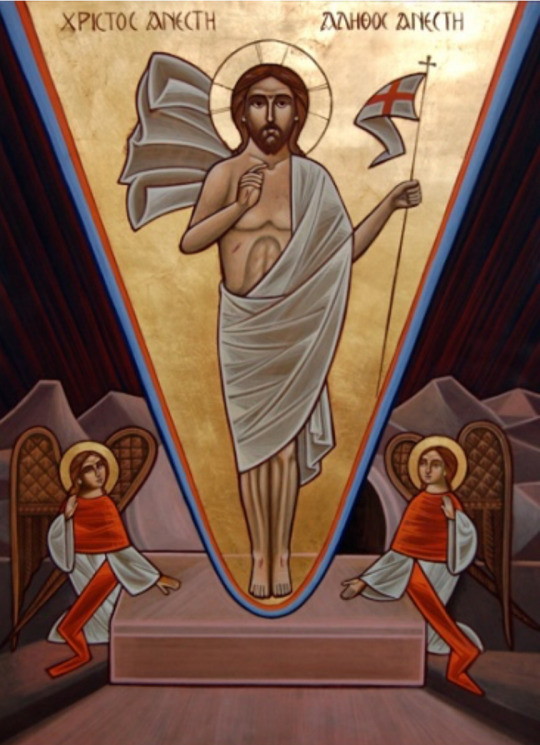
#father troy beecham#christianity#troy beecham episcopal#jesus#father troy beecham episcopal#saints#god#salvation#peace#faith#early church#theology#new testament#blessed virgin mary#holy trinity#easter
3 notes
·
View notes
Video
youtube
GROOVES n jamsS.O.T.Y. 2021 |||||||||||||||||||||||||||||||||||||| 35 ||||||||||||||||||||||||||||||||||||||
“Blackest Crow” by The Body and BIG|BRAVE
MG:
This might be a highly idiosyncratic note-to-self, or perhaps you, too, struggle with language, genre, and history, the way the three intersect in inherently limiting ways and how to bend those limitations to our use. I think it’s a shame we still mostly think of folk music the way we did when Bob Dylan recorded his first album. By the time he was on the Rolling Thunder Revue he’d already been cast out as rock music and we’re still careful to draw those same strictures around more modern records. It doesn’t limit artists, but it does limit the way we think about these genres and how we listen to music. “Blackest Crow” is a traditional Appalachian folk song, but as performed by The Body and BIG|BRAVE, it’s industrial, full of sawing strings and a fade-out dirge jam. This is but a tiny drop of the perverse directions folk music could travel, taking the original folk recipe and making it just slightly unpleasant.
Why do I care so much about new frontiers in folk music? Because as much as we’re told that oral traditions, parables, and standards are designed to be lost to time, inherently weaker than something more conceptual, like, say, cloud storage, it’s clear that these are still the guiding values of many communities and that as powerful as the internet is, as a tool and as a space, it lacks the permissive boundaries of folk storytelling. “Blackest Crow” is folk, I don’t have to strain to make my case when the material is this old, but I think we’ve also seen enough interpolation and sampling of the amen break to call it folk music, as well. I can imagine “Blackest Crow” playing at a particularly mournful 19th century wedding or solstice festival, something where a town gathered to formally dance. These events are still taking place, as Homecoming dances and as warehouse raves. Maybe the Cha Cha Slide is also folk music. Maybe a 4/4 beat is folk music.
DV:
I’m not the biggest fan of folk music except in the sense that I do strongly agree it’s a genre often constrained by its own self-imposed limitations, which to be fair is an issue for almost any classification system. What I like about this take on “Blackest Crow” is the way it reminds me about another drone: the one in The Beach Boys’ “Cabinessence”, a song about manifest destiny and logistics that also uses a crow as a measure of time and change. If we expand our definition of folk music to include any song with a crow in it, and why shouldn’t we, we find a folkloric relationship between the tale of loss in “Blackest Crow” and the way the enclosure of the American West - the railroads and farms and eventually highways - was its own kind of loss. These are songs bound together by their imaginings of what crows, the wisest (or at least cleverest) of birds, must know of the destruction humans can cause, whether personal or environmental or both. The seas may rage and burn, the meadows may be filled in with grain, but the crows will witness it all.
4 notes
·
View notes
Text
On Omega's "failed messiah" symbolism
How can the murderer robot from outer space be something like a Messiah?
In this post, I'll take a look at Omega's design, Omega's themes and Omega's battles.
1. On Omega's designs:
First we must understand that FFXIV Omega's designs are full of angelic/divine symbolism, but it isn't something we normally see in-game as we're too worried about larboard/starboard to pay attention. They feature feathers and wings everywhere. I'll put some examples here.
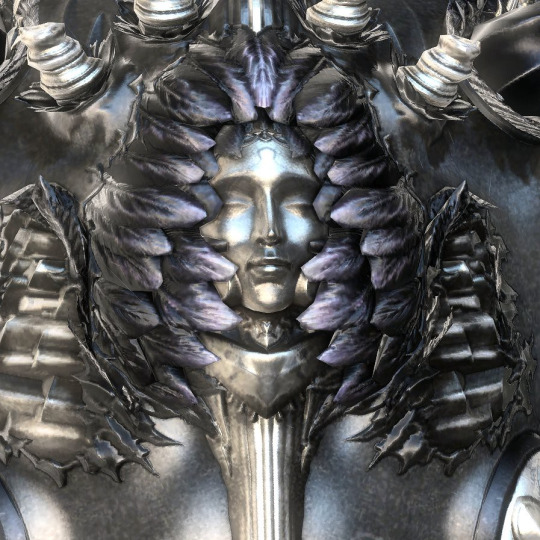
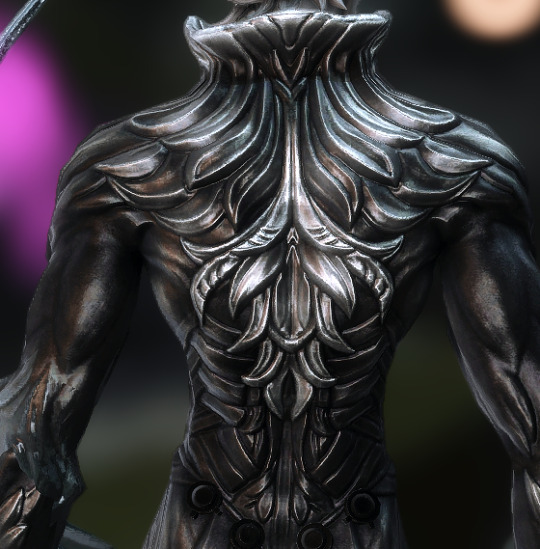
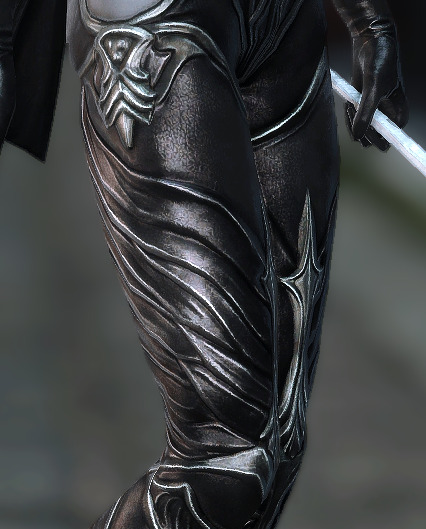
(Look at the Ω on that forehead!)
The best, greatest design is Final Omega.
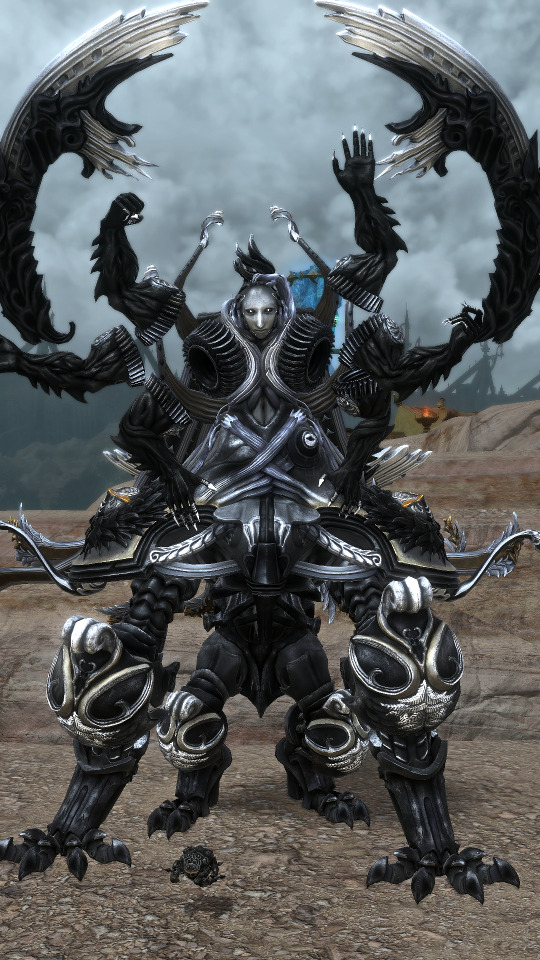
With its six arms and upper half that looks like a seated person, it reminds me of Avalokiteśvara, the Thousand-Armed and Thousand-Eyed Bodhisattva of mercy.
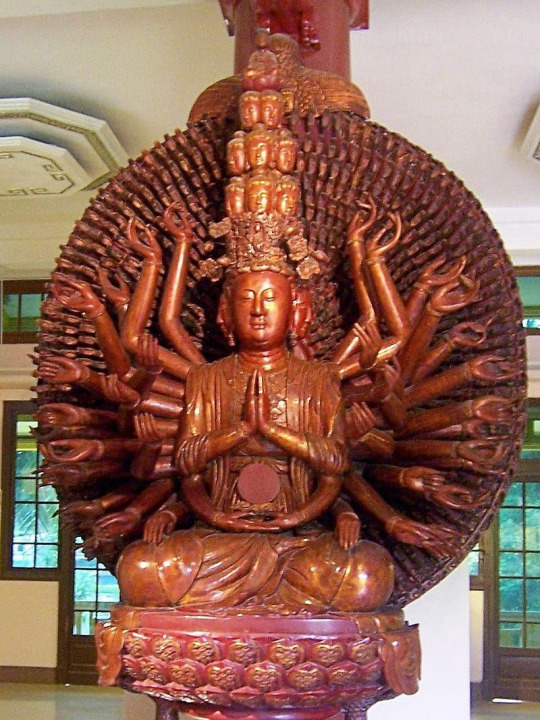
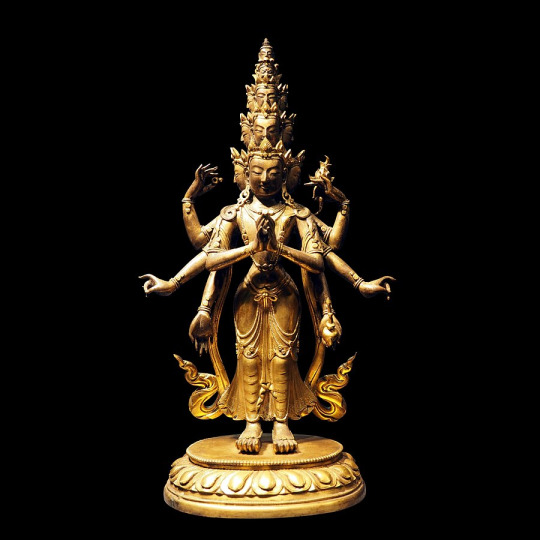
Final Omega features a three-part halo that unites to "download" its body, like the christian Holy Trinity that's both three persons and one person at the same time.
How can a being like Final Omega signify salvation?
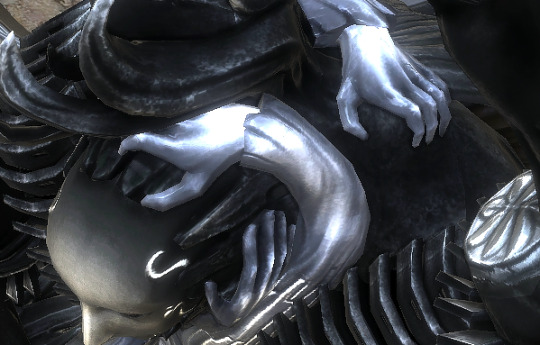
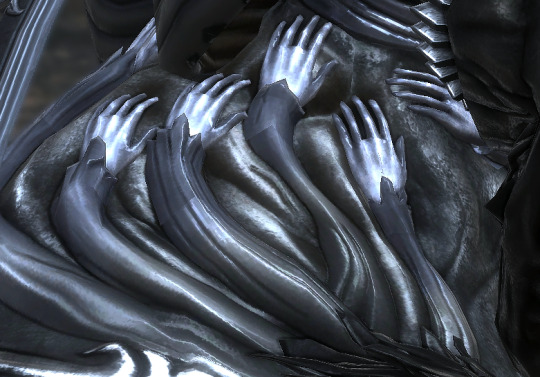
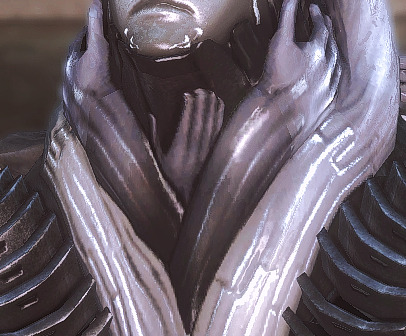
Just look at how many robed hands are trying to climb its body! I love that tiny little hand under its chin :) It's something that we couldn't see normally but messing with the models allows us to.
So we have Beetle Form that is elegant, full of silver and black feathers; Omega-M and Omega-F feature feathers and wings on their designs, and Final Omega itself is a legit bodhisattva, almost drowning in the sea of people trying to climb it to safety. Final Omega's face has some kind of shellshock expression -- a thousand-yard stare in a serious face. It has seen a lot of suffering and it is swimming in a sea of suffering.
2. On Omega's musical themes:
I've talked about From the Heavens in a previous post. I'll do it again here, but first I want to say that the expression "from the heavens" can both mean "Omega crashing onto Hydaelyn" and "Jesus' Second Coming", which isn't a stretch because Omega declares its Second Coming in-game. I'll get to that soon.
First, we got From the Heavens:
Our shadows lost in light, this life A fleeting kiss Hark! Temptation rings! Virtue slips through hands a-clenching wicked fruit Passion festers, black’ning sinless souls to root Sink’neath dark waters Drink deep, we suffer Drowning, drowning, drowning, drowning Irons sundered Paradise plundered Come welcome this Come welcome this Destiny Virtue slips through hands a-clenching wicked fruit Passion festers, black’ning sinless souls to root Sickles grate on heaven’s gate their fields ignored Seeking sinners deathlessly they reap discord As two become one Here ends this, our journey Never-ending, onward march! Witness our escape This our escape, this our escape This our escape, this our escape This our escape, this our ascension
Which is clearly a description of a Calamity related to hubris, the "blackening of souls", sin, temptation, and so on. The people singing it attain ascension in the very end, eScaping from the calamity. Who are those people? Those shadowless people that lost their shadows in the light?
The most interesting part is that it's sung in first person plural, ends with an ascension, and then comes eScape, which is sung in first person singular:
A drifting tender Come ride, heroes, ride Her galleon severed Away with the tide The stormheads gather Come ride, heroes, ride Illusions scattered Away with the tide Why Do weathered warriors wander their way whither wanting wonders wait Hark the heralds, anchors aweigh! Hither happens mine escape Freedom forgone, sinking apace. Comets crumble, Phoebus fades Under cosmic clamor decayed, hides a path untaken Ancient echoes Come ride, heroes, ride In deafening silence Away with the tide A wave of hazard Come ride, heroes, ride A-whorling inward Away with the tide Time Stellar stories starward bestrewn, slipping sidewise, see, they're snakes Twixt the leaves you'll find naught amiss—missing aughts and crossing fates Freedom surgent shifting ahead, comets dancing in her wake To the cosmic clarion's accord, along the path not taken Try, dare the dead tread ahead on a road that is borrowed design, Through the sum of their sons do they seek tomorrow Tonight, witness then as the end shall begin what was final Their lies, folding back, further back, ever back to the primal
Most of it is Omega's -- the people who ascended in the end of From the Heavens? -- escaping from a calamity. The "mine escape" means it's Omega itself singing it. The last part takes a break from describing the escape and turns to tell about how the calamity was felt: the dead walking ahead on a road that is borrowed -- not theirs --, seeking "tomorrow" through their descendants.
The end begins what is final: the cycle of birth and destruction and the Alpha and the Omega.
Their lies -- whose lies? -- fold back to the beginning. Could it be the ones that also lied in Invincible?
Lasciate Ogne speranza These memories ache with the weight of fate Ever we fight Never we fly Ever we fall Forever we fall Now breathe deep of the darkness beneath the flood Where all of the proud angels drink to their deeds of blood Their lies, twisted and torn, into dreams they're spun Yet ever we still stand tall Invincible Never we fall
Now that we've seen that Omega is an angelic being/bodhisattva with a backstory of Calamities and of having failed to protect its people, let's go to what it says through its fights.
3. On Omega's battles
The arena for Alphascape 4.0 is called Creation, Omega does a Genesis imitation where it becomes man and woman from another one's image instead of creating them from its own image -- while constantly creating life during the raid series --, and Alphascape 3.0 (Savage) got some surreal name attacks such as MRV Missile Kyrios, Long Needle Kyrios, Wave Cannon Kyrios, Condensed Wave Canon Kyrios and Guided Missile Kyrios, all while in Pantokrator Mode.
Wikipedia: Kyrios appears about 700 times in the New Testament, usually referring to Jesus. Wikipedia: In Christian iconography, Christ Pantocrator (Greek: Χριστὸς Παντοκράτωρ)[1] is a specific depiction of Christ. Pantocrator or Pantokrator, usually translated as "Almighty" or "all-powerful", is derived from one of many names of God in Judaism.
In Alphascape 4.0 Savage, when it changes phases, Omega goes:
Omega: Experiment concluded. I am the Alpha. I am the Omega. Wikipedia: Alpha (Α or α) and omega (Ω or ω) are the first and last letters of the Greek alphabet, and a title of Christ and God in the Book of Revelation. Book of Revelation 22:13: I am the Alpha and the Omega, the First and the Last, the Beginning and the End.
Omega's enrage in Alphascape 4.0 Savage is:
Omega: <blip> <bleeeeeep> Witness...my coming... I bring...reward...and retribution...for all! Book of Revelation 22:12: Look, I am coming soon! My reward is with me, and I will give to each person according to what they have done.
The text in Japanese makes it even clearer that Omega is quoting the Book of Revelation:
A Japanese translation for Rev 22:13 and 22:13: 見よ、わたしはすぐに来る。報いを携えて来て、それぞれの行いに応じて報いる。わたしはアルファであり、オメガである。 Romaji: Mite yo, watashi wa sugu ni kuru. Mukui wo tazusaete kite, sorezore no okonai ni ōjite mukuiru. Watashi wa arufa de ari, omega de aru. Japanese text: ワタシはアルファであり、オメガである!/ ガガ……ガガガガガガ……見よ、ワタシはすぐに来る……!報いを……携え……それぞれに……報いを……! Romaji: Watashi wa arufa de ari, omega de aru! / Gaga… gagagagaga… Mite yo, watashi wa sugu ni kiru! Mukui wo… tazusae… sorezore ni… mukui wo…! Direct translation: I am the Alpha and the Omega! / Gaga… gagagagaga… Behold, I come quickly! Rewards (direct object)… I bring… To all… Rewards (direct object)…! My translation: I am the Alpha and the Omega! / <blip><bleep>… And, behold, I come quickly! … And my reward… to give every man… shall be…! Official text: I am the Alpha. I am the Omega. <blip><bleeeeeep>Witness…my coming… I bring…reward…and retribution… for all!
Why is Omega literally Christ in the XIV universe, then?
If you look at my previous post, I theorize Omega was created to halt the Apocalypse. In a way, Omega sounds like a failed mechanic messiah: created as hope for its people, it failed to save them from not one but two calamities -- the Final Days themselves and the Sundering -- and ended up not even dying with them, but being one of the four survivors along with the three Unsundered: Elidibus, Emet-Selch and Lahabrea. Christ died for the sins of all humanity, came back to life, ascended to the heavens and made his second coming from the heavens; Omega at first ascended in a weird way -- two or more people becoming Omega, maybe, like sacrifices were required to summon Zodiark and Hydaelyn? --, and then did not die, and made its second coming for nothing, saving no one.
Or did it die in a way?
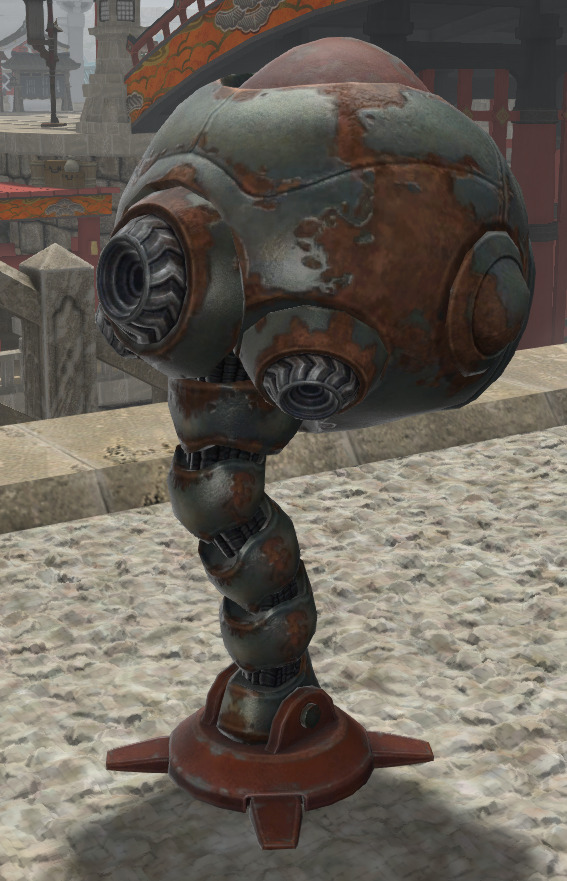
Why does Omega first appears before you as a rusty, old Level Checker? Like it was underwater for some time -- drowning, drowning, drowning, drowning; drink deep of the darkness beneath the flood --, like the First's Amaurot...?
Thanks for reading! :)
6 notes
·
View notes
Photo

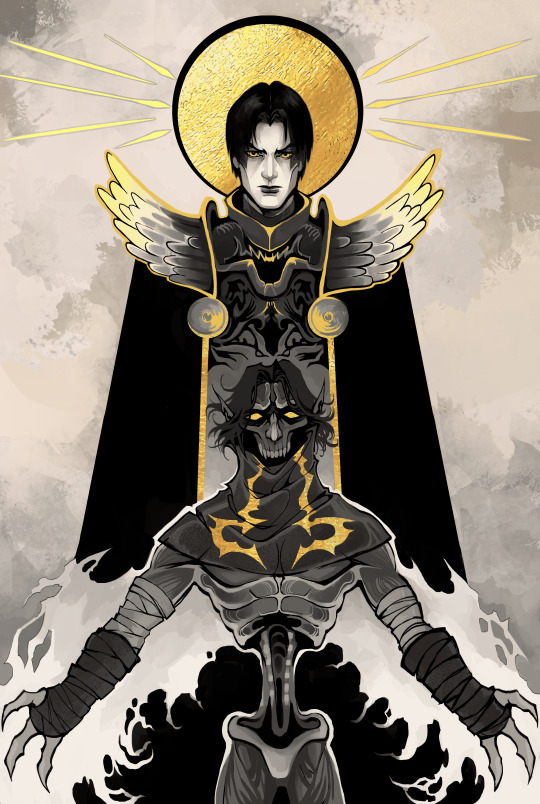
In which I chronicle my Legacy of Kain journey and bridge it with your boy Adam Warlock! (Part 5 of many, and MASSIVE, I MEAN, HUMOUNGOUS SPOILERS for Soul Reaver 2 and the 1970’s Warlock)
Awwwwwwwww yeah we are going there, these compositions are most definitely on purpose.
This is where I realize that my true purpose in this world is to draw and talk about obscure or forgotten works of fiction, and I embrace this destiny.
Ladies and gents, laughing times are over (not really though), sh*t gets very real again.
I guess it’s a bit late for this but if you have even the slightest interest in checking any of these properties out, do yourself a favor and go experience them first hand. If you just want to see me lose my mind and don’t really care about spoilers then please, proceed.
You know, when I started this little crossover of sorts, I was just having a laugh you know? It was just a cute little thing, I’ll write this one post and maybe I’ll get enough material for a second one and that’s it. THIS IS THE SEVENTH POST (even though it says Part 5).
Never, and I do mean never in my wildest dreams did I think I would be here one day, talking about having your past and your time-travelling-future selves meet and clash, of seeing your sanctimonious attitude and overall the worst about yourself personified and given free reign to go on bloodthirsty crusades showing off how much of a hypocrite you’ve bee- but wait, I am getting a bit ahead of myself.
I’ll get there I promise, let’s go back a bit.
Where we last left off, we managed to travel back to an even more distant past than we’ve been before. To the time of the great Vampire Purge, so that Raziel can meet this infamous ancient vampire who knows all the lore and might have the answers we seek on what exactly is causing the corruption of our world.
As we step out into this era of History we notice the fields covered with the Sarafan Order banners, and the impaled corpses and chopped-off heads of vampires. No different no doubt from the kindness vampires showed mankind later when they gained the upper hand during Kain’s 1.000 year old reign. Raziel seems a bit distraught by the sight since he assumed the Sarafan to be virtuous and heroic:
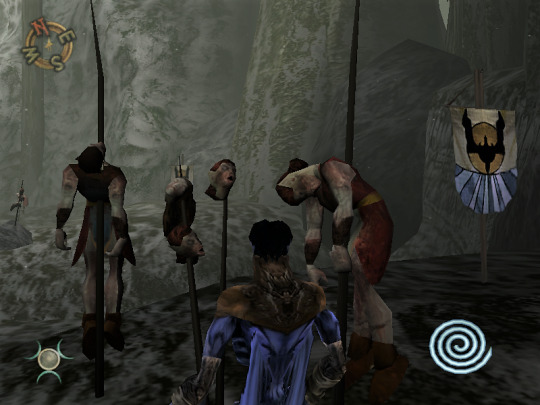
“For all the butchery of Moebius’s crusade, this massacre was somehow more chilling. The killing fields of the Sarafan betrayed a kind of orderly ruthlessness, the cold-blooded righteousness of the true believer.”

“Here at last in the flesh, I beheld my former brothers-in-arms, the warrior-priests of the Sarafan order; their lives devoted solely to the annihilation of the vampire plague. And while I confess I felt a twinge of longing, a pang of grief for what I had believed was my lost virtue, I regarded them now with none of the reverence I formally felt. For I had seen the human face of the vampires, and now I beheld the monstrousness of these men.”
While on the topic of genocidal holy wars, my boy Adam here had a bit of a run with a similar pious little group that goes by the name of Universal Church of Truth, who were going about doing a bit of cleaning throughout the galaxy:
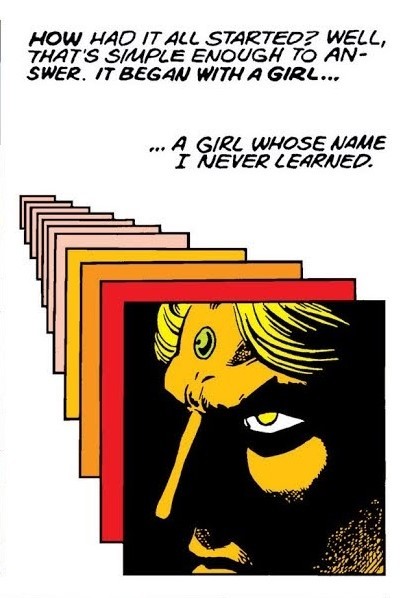
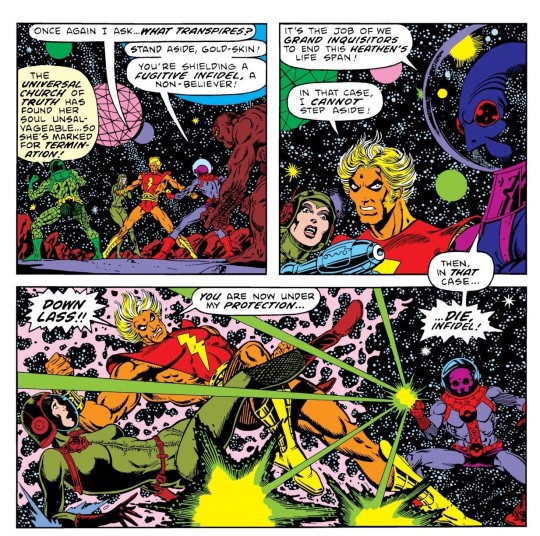
Things don’t go so well:
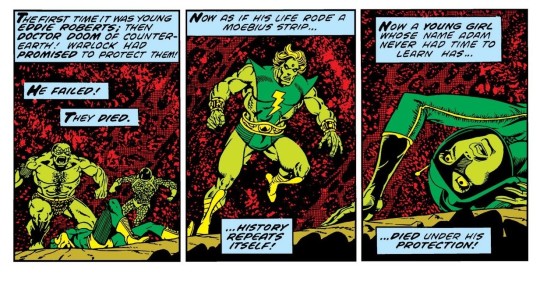
Interestingly enough, I’ve learned of a deleted cutscene for Soul Reaver 2 that plays out very similarly to Adam’s first encounter with this “holy” order. There was this minor female vampire character that was being hunted down and would be executed by vampire hunters right in front of Raziel.
This scene was probably removed because they knew that almost 20 years later there would be some asshole on the internet trying to compare their games to obscure marvel comics of the 70’s.
But yeah bummer for Adam here, we’re a couple of pages in and he’s already failed to save someone. However, through the power of the Soul Gem, he’s able to retain her soul for a brief moment, letting us know more about these holy inquisitors:

Some of these methods don’t seem that far off from the Sarafan, especially on the twisting of good intentions part, but on a galactic scale:
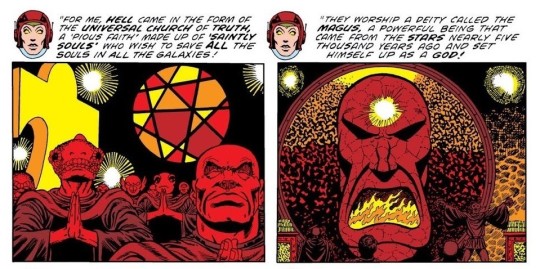
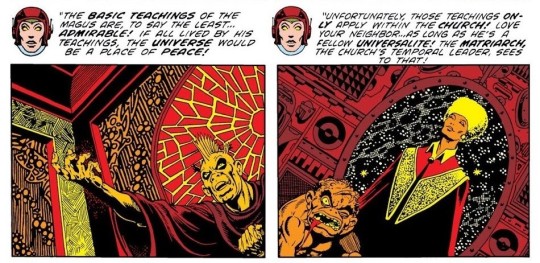
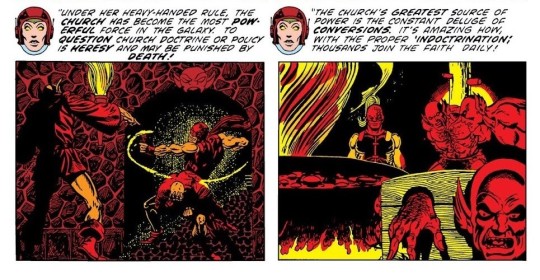
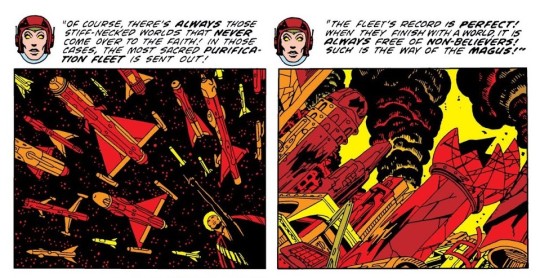
Aye, a great bunch o’ fellas all around, if you submit and “fit in”:
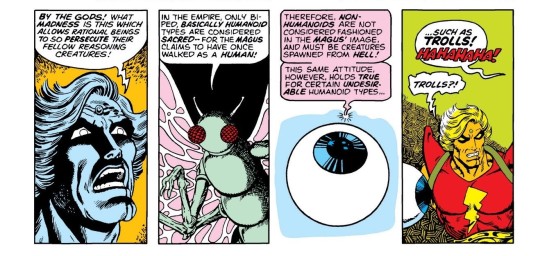
Damn.

Hush Adam, I’ll get back to your predicament give me a moment. I just want the good people at home to keep both this church and the Magus, the god they worship in mind for later.
Now, back to the game. In the Sarafan Stronghold during the first hour of gameplay, Raziel made comments on the vampire he’s currently seeking while looking at some stained glass depictions:

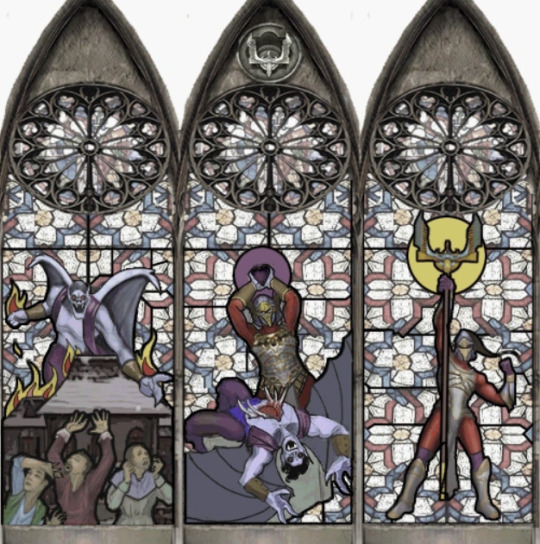
“So this was the legendary Janos Audron - reputed to have been the most ancient and diabolical vampire to have ever existed. According to folklore, he lived high in the cliffs of Nosgoth’s northern mountains, and preyed mercilessly on the defenseless villagers below. His reign of terror ended when the Sarafan finally hunted him down and tore his throbbing heart from his still-living body. (…) But I wondered - could Janos Audron truly have been as monstrous as depicted here? Or was this merely artistic licence by the Sarafan, who sought to lionize themselves by demonizing their darkest enemy?
Keep these stained glass images in mind, they’ll also be important shortly. Neetheless to say, the hype was very real to meet this Janos Audron.
And as I kept hearing about this gentleman, I thought: “I really love this cast of pricks, where everyone speaks in half truths and is hiding something and has some hidden agenda, but you know, I kind of wish there was some slim ray of hope, of goodness and honor, just some good old plain chivalry and honesty. Maybe this Janos lad won’t be as bad as he was depicted back in the Sarafan Stronghold.”
It took us a while but we’re finally make it to his retreat.
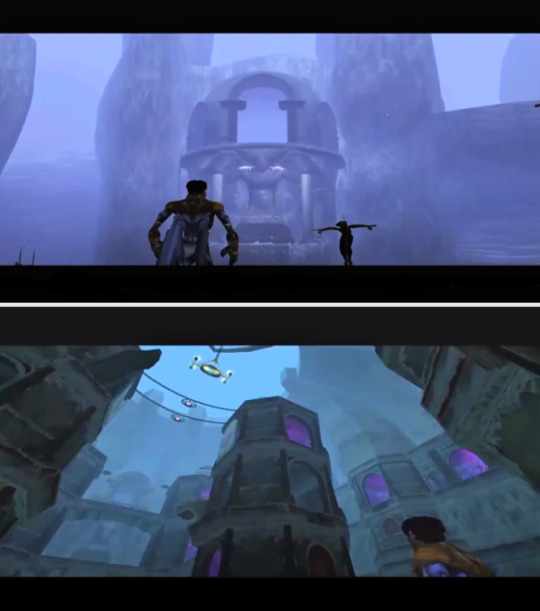
I really love the entire segment, the hopelessness and feeling of dread while making your way through this place, probably my favourite puzzle area of the game. I also really love the music and architecture here.
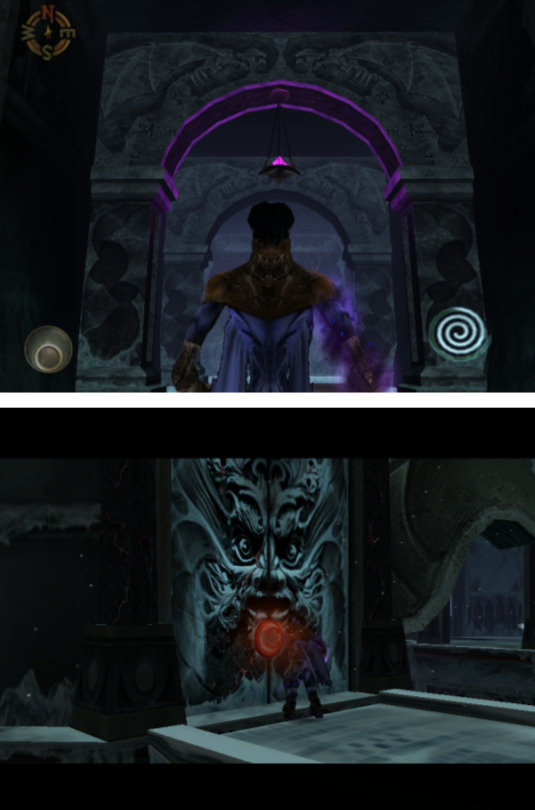
When we do make it to the top, BOY OH BOY were my prayers answered!
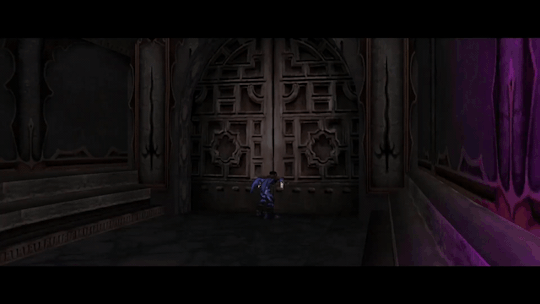
Lo and behold, enter Raziel’s new daddy/mentor figure, my man JANOS AUDRON! Proabably the one decent and kind creature I’ve seen yet in these games (if you don’t count helpless human npcs who are just trying to live their lives but are caught in all these wars, slaughter and destruction).
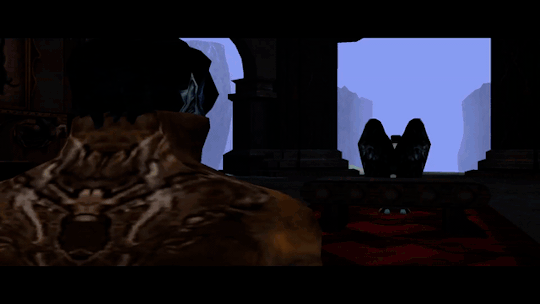
FINALLY an understanding, moderate, compassionate man in the midst of all the lies and deception. I love him! Oh and he has what seems to be a Romanian accent. Maybe a nod to the granddaddy of all vampires: Dracula? I think his design is cool as well, so that helps.

Before we go into huge lore dumps and while on the topic of having a brief father/mentor figure for your protagonist when he’s utterly lost, alone and confused, I thought I’d bridge it with Adam’s own once foster parent, the High Evolutionary:

From the few minutes you get to know these dads they’re very different characters with different backstories and motivations. Janos is this sad lonely old man, the last of the ancient vampires and one who has been keeping himself alive solely for his sense of duty.
While the High Evolutionary was once a man called Herbert Wyndham who performed an experiment that evolved him into a godlike being. This experience proved to be such an assault on his senses and perceptions that he chose to encase himself in this armour. Like the name suggests he is obsessed with genetic manipulation and tampering of various kinds, it is his life’s ambition.
Despite his somewhat villainous appearance, he’s never portrayed as such from what little I’ve read, he’s just…a bit creepy. Like, he takes Adam in and is super stoked about adopting him, but he also values him not so much as a person per se as you and me would, but more as one would value an impressivly carved piece of work:
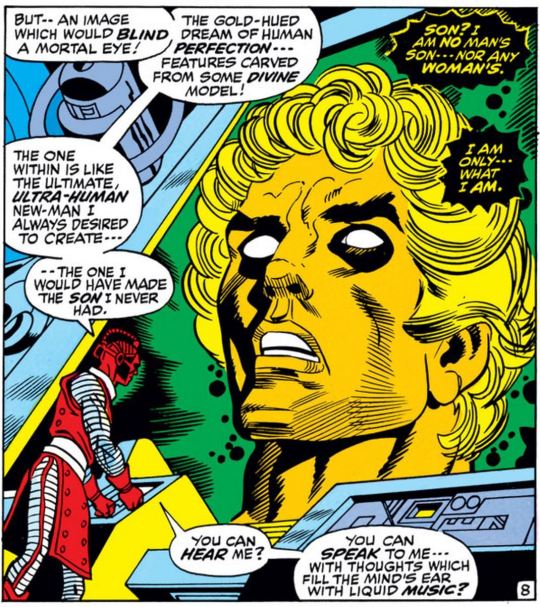
I don’t know, maybe it’s his metal face that doesn’t emote much; his sometimes questionable morality; maybe it’s the fact that Adam was 5 years old at this point, a baby boy, and this pink armoured deity is super hyped about him; there’s something a bit unsettling about this guy. Have some more dubious quotes I’ve stumbled upon:
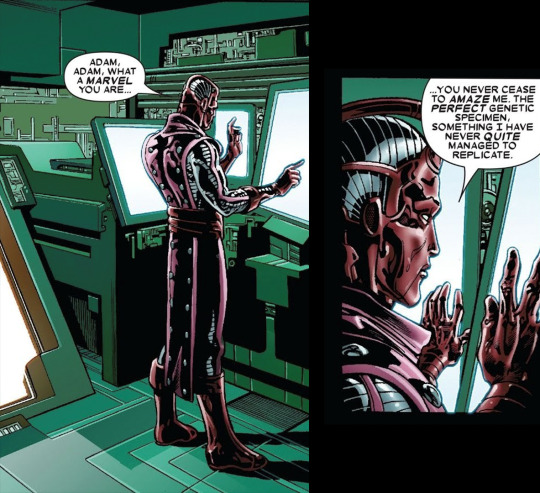
All in all, I think he did care about him, in his own strange way:
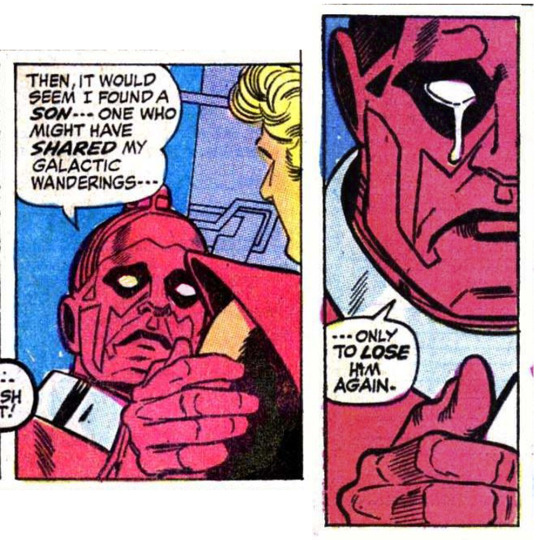
Anyway, what’s important is that these adoptive dads serve a somewhat similar purpose, and that is to push/urge our ”“”“"heroes”“”“” (I say with many quotation marks) into a more benevolant role: to guide them in their messianic mission and save a corrupted world. Basically there to provide a chance for them to be good boys. Up until now their track record leaves much to be desired, and they’ve been quite lost on what they’re supposed to be and do.
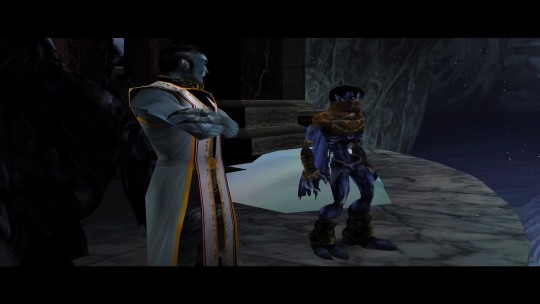
Raziel:
“So it’s all true, then - what Kain and Vorador have told me - I really am some kind of unholy vampire messiah…”
Janos:
“Unholy? -no. Messiah… perhaps.”
Raziel:
“I don’t like that word - it smells of martyrdom.”
Janos:
“Raziel, your role in this world’s destiny is more crucial - and more benevolent - than you’ve allowed yourself to believe. Your journey will not be easy - dark powers are allied against you.”
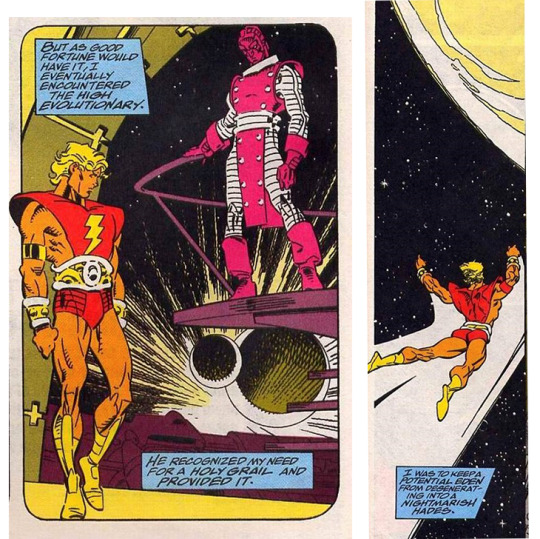
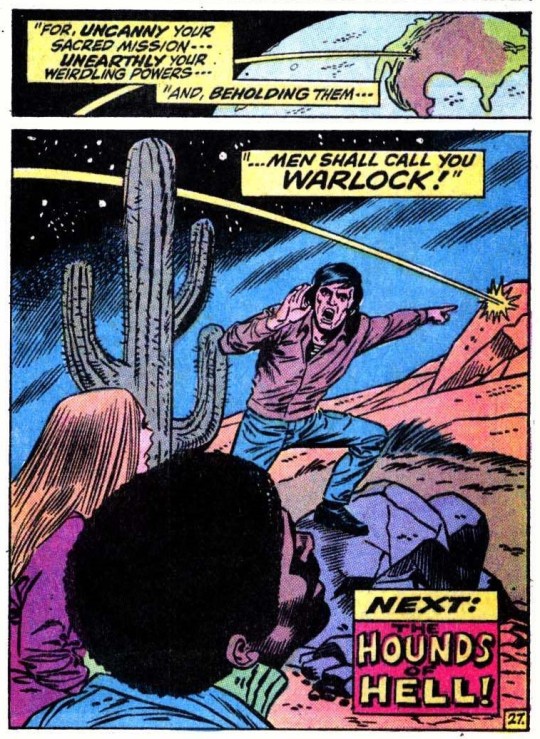
Oh and both dads give their sons their toys (Soul Reaver and Soul Gem):
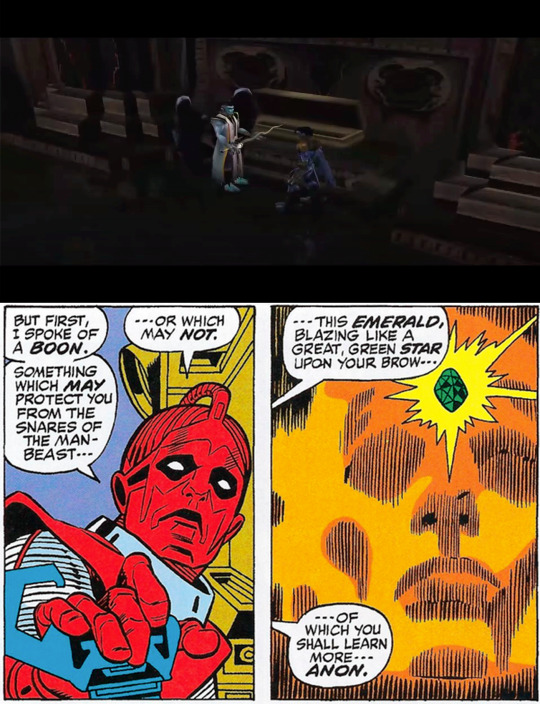
Back to the meeting with Janos, we finally learn tons of things, both new and others that have been hinted at throughout, namely:
Janos has been living a life of a recluse, alone, on top of the Aerie;
Janos knows of Raziel (some old legend I think) and has been waiting for him to hand him over the Soul Reaver, saying it is the key to save Nosgoth;
The Pillars of Nosgoth were erected by the ancient vampires and they were the rightful guardians. Janos was called to be th 10th guardian, the Keeper of the Reaver;
Over time this ancient race started to die out, with their history slowly being forgotten;
Humanity prospered and since the Pillars choose their guardians from birth and vampires were no longer born, humans were called to be their guardians but were “wholly ignorant of their true purpose.”
The Circle of human guardians is led to believe (by whom we do not yet know) that vampires are a cancer in the world. Janos warns that “with their vampire purge, the members of the Circle have assaulted the very architects of the Pillars they are sworn to protect (…) With every vampire they kill, the humans are slitting their own throats.”
Janos being a cool level-headed guy here when Raziel says he must hate mankind for all the suffering they’ve brought to him:
“They fear what they don’t understand; and they despise what they fear. But no - I do not hate them.”
I find it funny how Raziel asks if humanity should be forgiven for trying to exterminate the vampire kind and doesn’t realize that: one, he himself was exterminating vampires just a couple of moments ago back in SR1; and two, how he is just like how Janos describes humanity to be:
“They don’t understand what they’re doing. They are simply unenlightened… and vulnerable to manipulation.”
Again, this last line, completely unlike a certain blue shambling corpse I know. Not like him AT ALL.
Then, as they head inside, we learn something odd as Janos presents Raziel with the Reaver. You see, the two times Raziel has been close to the Soul Reaver still in its physical form, reality started to bend and distort (I show it off in this previous post).
When we met Kain and decided not to kill him, he explained that when: “two incarnations of the blade meet in time and space, a paradox is created, a temporal distortion powerful enough to derail history”
This distortion, or sense of displacement however, is nowhere to be found now when Janos presents the blade to him. Raziel feels nothing and says that “this nothingness is somehow worse…” and to get it away from him.
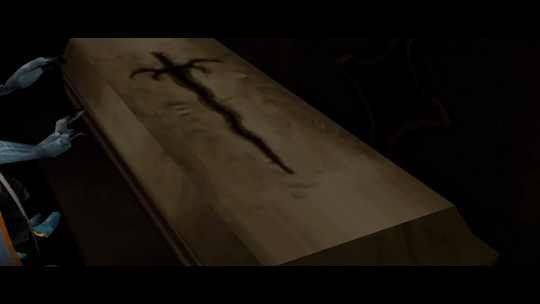
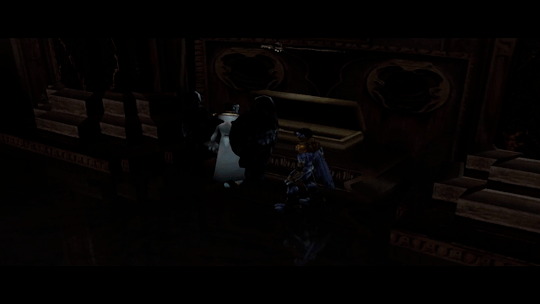

We learn the Reaver was forged by the same ancient vampire race that erected the Pillars (which we’ve seen hinted at when we explored the land and came accross all sorts of old murals).
But now THIS is when the game first impales me through the heart.
Me and Janos are interrupted by the Sarafan warriors who arrive carrying Moebius’ Staff (which disables vampires to the point of being barely able to move at all).

And of course! OF COURSE! Of course the moment my boy Raziel finds a truly positive influence in his life to guide and enlinghten him, and that was willing to put himself in danger in order to save him… he is axed! HEART RIPPED FROM HIS CHEST!
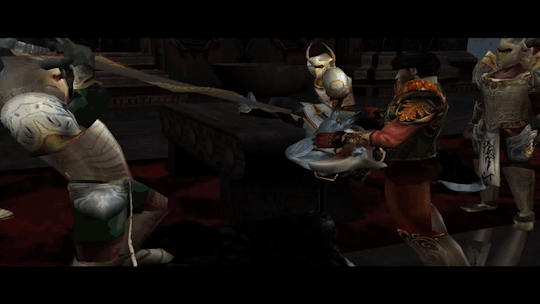
And by whom you ask? Who would do such a deed and kill my last ray of hope?
WHY, ME!
TWICE!
“Me” because I was the one to open an entrance to Janos’ up until then impenetrable retreat, and literally me: human Raziel of the Sarafan that lived during this time period and was head inquisitor!

A bit different from what was depicted back at the Sarafan Stronghold, we found several centuries later (putting the same image here again so you don’t have to scroll up to compare, am I swell or what?):

The Sarafan escape with Janos’ heart and the Reaver, while wraith Raziel has a final moment with Janos.

This part destroys me:
Raziel:
“Forgive me; I’m sorry… I failed you.”
Janos: (gently)
“No, Raziel. Perhaps this was my true purpose - simply to save your life this once.”
Raziel: (distraught)
“While I have taken yours…”
That last bit is probably my favourite line-read in the entire series so far (which is the most impossible thing to choose since there are so many great ones). But I think it’s the overwhelming sadness in Raziel’s voice that makes it memorable, you’ve never seen him feel like this for another creature.
Breaks my stone hardened heart every time I listen to it. And here’s why I think it’s an effective emotional scene, even though we only get a few minutes with Janos before he is murdered - it is because of contrast. Up until now everyone you meet is some degree of a bad or manipulative person, and you don’t really have a true friend or someone to confide in, there’s no one that really brings out the best in Raziel and it sucks because there is potential there. So when you introduce the apparently only decent and noble person in this god forsaken land and you’re so used to by now suspect and mistrust everyone, it is impactful because he was truth and honesty in a sea of deception and moral relativism. He was my light in the midst of the fog and the one who saw good in me. And right when you’re finally relaxing and getting confortable the game pulls the rug from under you.
Now, while on the topic of having your past and future meet, there was a little something about the meeting between Adam and the Universal Church of Truth that I’ve been saving up until now. If you remember, Adam was interrogating the young woman who was killed by the inquisitors about the church and the god they worship. When suddenly:
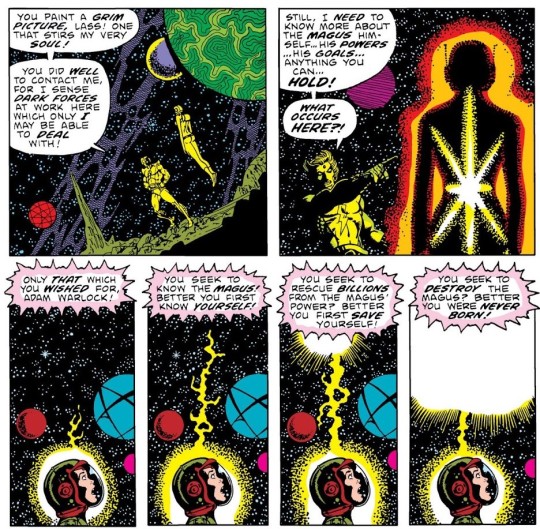
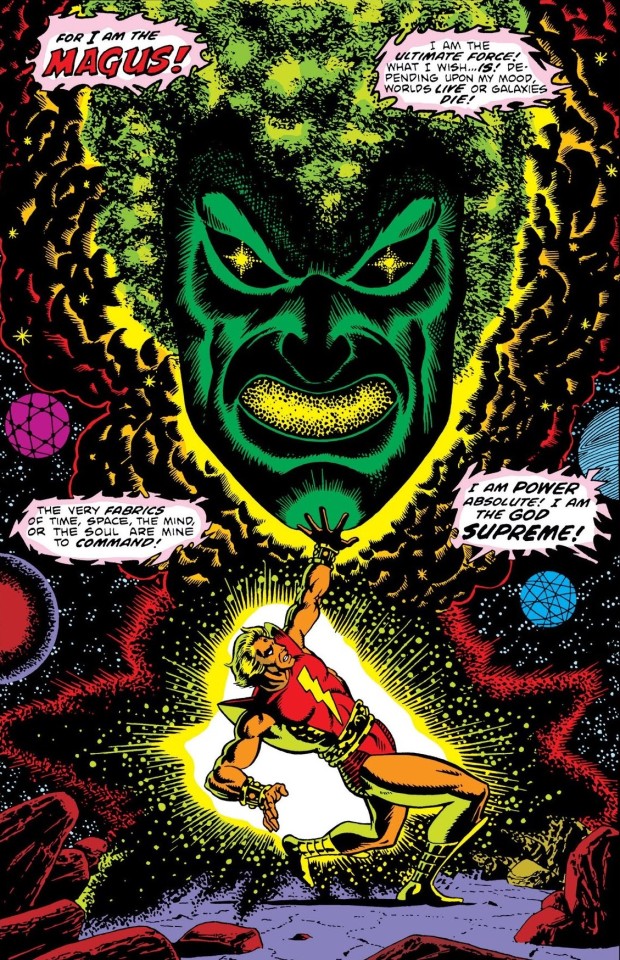
Good news is, Adam must’ve taken a left turn somewhere and ended up on the set for “Monty Python’s Life of Brian”, where he learned some latin:
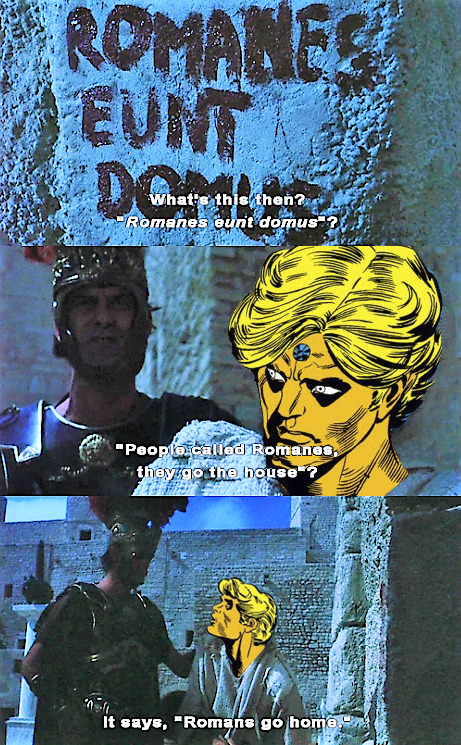
This helped him quickly figure out the Magus’ identity:
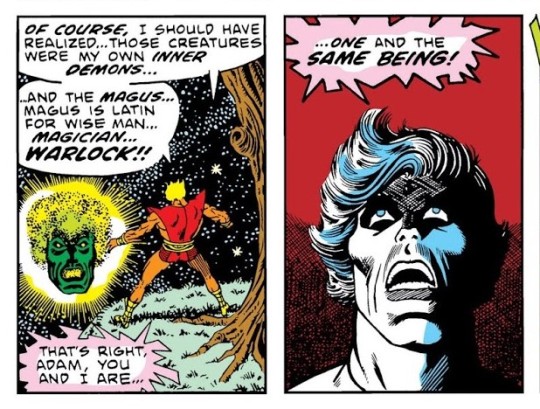
Learn your dead tongues kids, you never know when it might come in handy when meeting your time travelling, thousands of years old future-self:
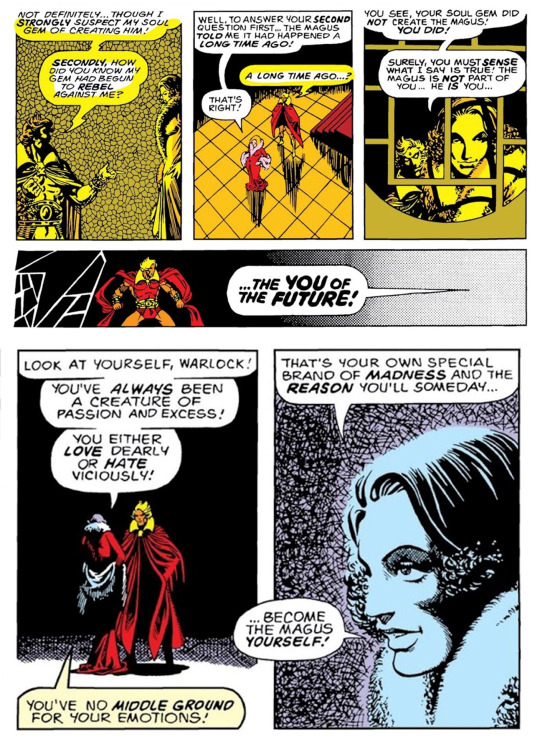
So as you can se, we have a similar self-discovery journey going on but reversed in a way. In Raziel’s case you play as his future self, who time travels back in time, meets his past self and sees what a hypocrite he’s been his entire life. In Adam’s case you follow his present self, who meets the Magus (his future self), who has travelled back in time 5.000 years, in which time he has built his empire. Meeting and confronting said empire/future self, leads Adam to see what a hypocrite he’s been his entire life. You see, both Adam and Raziel have always been their own worst enemy (their own shortcomings and character flaws). So it would be only natural that we get embodiments of the worst in them: Raziel, the human Sarafan Warrior and the Magus, their past and future selves respectively.
Oof, this was a long one, and I’ve reach the character limit. In the next post I’ll elaborate more on their characters and different selves; and we go through the roller-coaster of emotions that is the endgame for both these stories.
Look foward to me losing my mind even further while I go into time travelling, paradox shenanigans… oh, and look foward to happier times with COSMIC SUICIDE! See you in the near future.
#the infinity legacy#legacy of kain#soul reaver 2#raziel#adam warlock#the magus#marvel comics#marvel cosmic#this post drained my spirit#my fan art
232 notes
·
View notes
Text
Lokabrenna - Loki & Fire & Swords, Part 2
This is a sequel to this post here
This is why I don’t mind trailing off in a post sometimes. People come by and give me new information to chase. Thanks to @whatyoufish4 for informing me of some more Loki-Fire facts. Because learning one simple word has taken me down a rabbit hole...
Lokabrenna translates as “Loki’s Torch” or “Loki’s Burning”.
Lokabrenna was the Scandinavian name for the North Star, AKA Sirius, AKA the Dog Star, AKA My Favourite Harry Potter Character.
It’s also, Google informs me, the name of a Black Metal album by Nawaharjan (meaning Corpse Army, which may be another reference to Loki, neat), released in February of 2020.
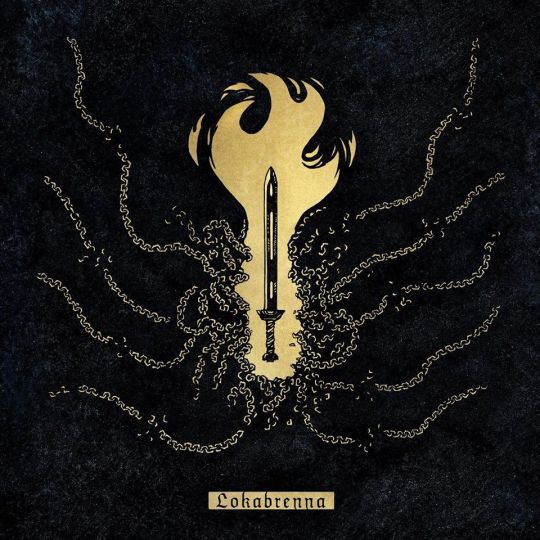
I’m not much of one for black metal, but I found the description of why the band chose to name their album after Lokabrenna good for our purposes as well:
“The album’s namesake, Lokabrenna is the Scandinavian name for the star Sirius...The star is associated with important destructive and liberating attributes in many cultures worldwide.
“Within the Brandawegiz tradition, Lokabrenna is associated with the liberating powers of Loki. It is also linked to the destruction of the cosmos that follows after the release of the flaming sword Lævateinn during Ragnarök and Loki’s transformation into his final, liberating aspect Hveðrungr.”
I’m not sure what or who “Brandawegiz“ is, I think it’s something to do with metal music and therefore very outside my knowledge - but now I’m beating myself over the head for failing to mention the sword Lævateinn! Because this is the sword forged by Loki himself in Norse Mythology! Although there’s some contention there - some think it’s more of a magic wand or staff, or maybe a dart or arrow, or perhaps even a shape-shifting weapon. Apparently that’s due to contention over how to translate the name. To quote Wikipedia:
To be fair, Lævateinn or læ-wand can have three possible senses of meaning,[11]...The three meanings of læ (the nominative case of læva) are: "cunning", "deception", and "injury".[12][13] The weapon's name is glossed as "wand of non deceit" in passing without further explanation by Einar Ólafur Sveinsson.[1][14]
Wand of non-deceit? Sounds a little like a thesaurus reworking of ‘Sword of Truth’. Probably a coincidence, but...when it comes to these posts, I make coincidence a three-course meal with an ice cream stopped for on the way home.
So, anyway - Lævateinn. It’s from a poem called the Fjölsvinnsmál, one of the youngest Eddic poems. And it has a great deal of fire in it.
To sum up a very old, partially corrupted and very confusing story and cut to what interests us today, there’s essentially a hero named Svipdagr, who’s got to kill the Rooster at the top of Yggdrasil as part of his quest to wed Menglöð, who is trapped inside a fortress made of fire. The only weapon that can slay the celestial cockerel is the flaming sword Lævateinn, forged by Loki.
This is interesting, because other than this I’d not much heard of Loki being connected to forging - that was always Thor, who has many ties to blacksmiths. Then again, Loki is around dwarves a lot - maybe he learned a thing or two after commissioning Thor’s hammer from them in the first place. How interesting that Marvel comics have Loki again forging his own weapons as well.
The poem also implies that the hall of flames was also constructed by Loki. How interesting. This poem leaves a lot of questions - why did Loki forge the cockerel-slaying blade, and construct the hall? Well, the cockerel is probably related to the one that raises Odin’s soldiers from the dead with his radio-clock-alarm call. And the hall contains Menglöð and will only open to a hero with the true name Svipdagr, but only if he kills the cockerel. So it would seem implied that this was Loki’s plan, or some sort of destiny driving everything towards Ragnarok and end of days.
(I’d like to recommend this post, which goes into much more detail about Loki’s role in this poem. It also gives more details on why some think Loki was originally a fire giant and his connection to Surtur, expanding what I touched on previously.)
Speaking of driving everything towards Ragnarok - what about this bit of that wonderful album write-up?
Loki’s transformation into his final, liberating aspect Hveðrungr.
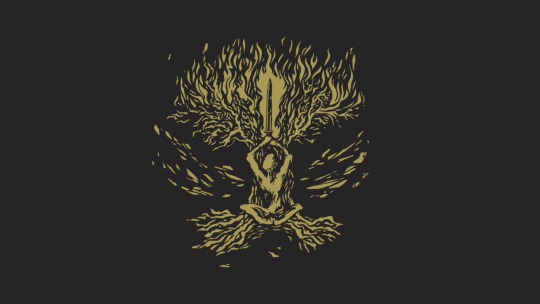
Hveðrungr - A name meaning ‘Roaring’, as in the sound of an out-of-control conflagration, or that of a howling storm. It appears as a name for Loki in the Völuspa (incidentally, I’ve been using parts of that poem in Finnesang), which is a seer’s prophecy about Ragnarok. It’s the name used for Loki as an apocalypse-bringer.
I like what Nawaharjan are implying here when they say that Hveðrungr is a liberating aspect of Loki - I’ve always felt bad about Loki’s transformation into the world-destroyer Snorri Sturluson helped make him and considered it a character assassination of the lighter character I’d come to love in my Norse Mythology books as a child. Yet this different perspective is one to consider. The album cover depicts Loki’s flaming sword severing the chains that bound him to the rock, where he was tortured by acidic serpent’s venom by the Aesir, the people he both despised and desperately wanted to be loved by. In freeing himself and beginning Ragnarok, in unleashing all of his fury and pent-up destructiveness, maybe he did become someone else - a Roaring. After all that treachery, maybe it was cleansing.
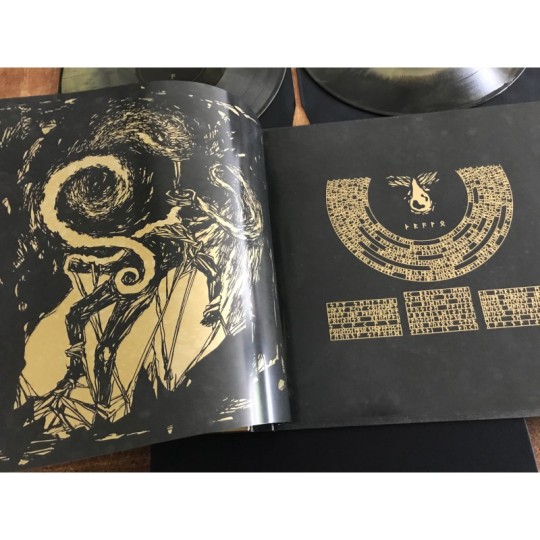
I seriously want a copy of this LP now, and I’m positive I won’t really listen to the music too much, ha ha. It’s just so shiny!
To doubleback to where we all started with this, though - Lokabrenna, the star. Let’s get serious about Sirius for a second.

It’s the brightest star in the sky and used as North in navigation. Ancient Greeks believed it could make dogs behave strangely in summer (where the term ‘Dog days of summer’ comes from). It can be seen as a star of ill repute. Homer describes it in the Iliad as:
Sirius rises late in the dark, liquid sky On summer nights, star of stars, Orion's Dog they call it, brightest Of all, but an evil portent, bringing heat And fevers to suffering humanity.
Interestingly, many indigenous people in North America also associated the star with canines. The Cherokee believed it one of a pair of guardian dogs on either end of the Path of Souls. Some Inuit tribes called it the ‘Moon Dog’, while the Pawnee tribe called it Coyote Star (another famous trickster) or Wolf Star. Funnily enough, Chinese astronomy called it the ‘celestial wolf’ as well.
No matter where, though, Sirius is one of the most important celestial bodies there is thanks to its role in navigation. It’s odd that the Norse decided to name it “Loki’s Torch”, especially since Loki has a strange place in the pantheon, with few known worshipers. They could have called it Odin’s Eye, or Thor’s Toe-Nail Clipping, or Fenrir’s Spittle - but it’s called Lokabrenna. A guiding torch to lead people home or out into the unknown.
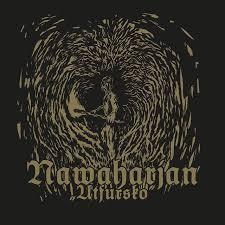
Loki with his torch, alternative cover for Lokabrenna (2020)
18 notes
·
View notes